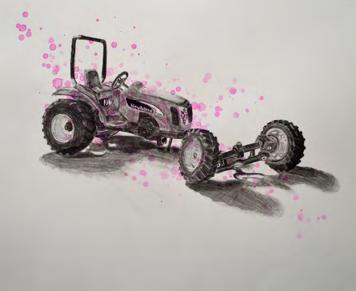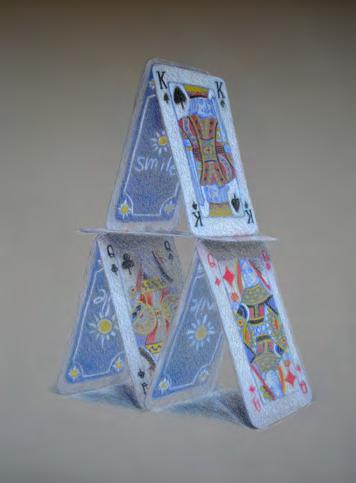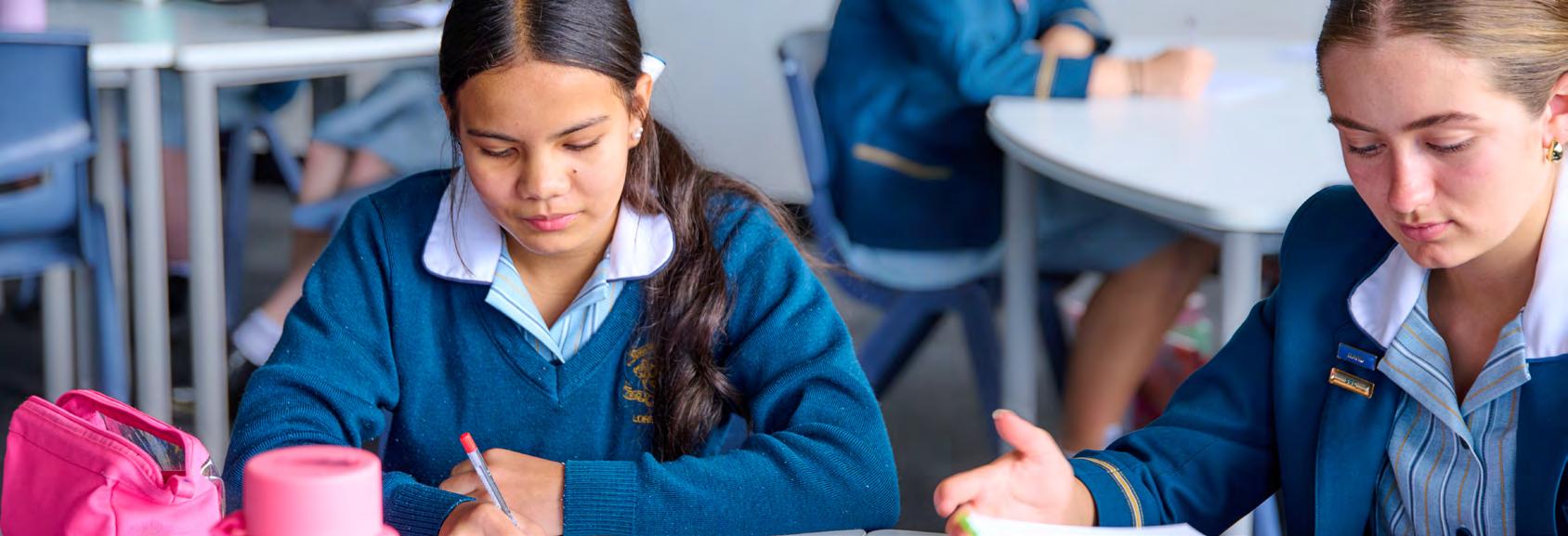
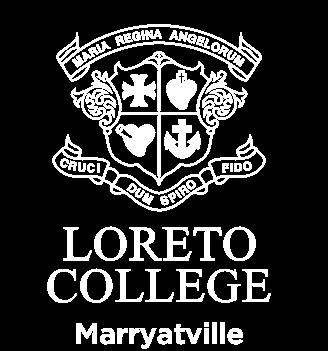
Year 7, 8, 9 and 10
>
> Mission and Values
> Educational Model
> Social, Emotional and Academic Development
> Subject Flow Chart
SUBJECT SELECTION:
> Year 7
> Year 8
> Year 9
> Year 10



Year 7, 8, 9 and 10
>
> Mission and Values
> Educational Model
> Social, Emotional and Academic Development
> Subject Flow Chart
SUBJECT SELECTION:
> Year 7
> Year 8
> Year 9
> Year 10
Loreto offers a broad range of subjects providing all students with an opportunity to choose a course of study to meet their individual interests.
In order to best prepare our girls to undertake the SACE, from Reception to Year 10 we use the Australian Curriculum as the basis for learning. The Australian Curriculum provides a flexible framework from which teachers are able to develop courses that best suit the needs and interests of our girls, while ensuring the outcomes of the Australian Curriculum Achievement Standards are met.
The Australian Curriculum allows for an inquiry based and integrated learning experience to occur which is important in the development of critical and creative thinking skills. The Australian Curriculum clearly identifies the capabilities we want to develop in our girls which are literacy, numeracy,
Information and Communication Technology, personal and social capability, ethical understanding, intercultural understanding and critical and creative thinking. Through the design process of each of our courses from Year 7 to 10, the capabilities remain at the forefront. We ensure that we are providing opportunities for students to develop the skills and complex competencies to thrive in their future, as well as supporting them to develop their knowledge and understanding in a wide range of disciplines. In each of the different areas the girls are involved in learning experiences that utilise
design thinking, inquiry processes and entrepreneurial thinking.
At Loreto our Senior Secondary students undertake the SACE. The SACE is internationally recognised and provides opportunities for all students to succeed. Students are provided with opportunities to develop a high degree of research capability through the SACE as well as the opportunity to engage in a wide range of specialist subjects. Students should carefully read the course descriptors for each of the subjects they are considering choosing and speak to their subject teachers and/or mentor teacher if they require assistance.
LEARNING AT LORETO COLLEGE MARRYATVILLE
> Welcome
> Mission and Values
> Educational Model
> Social, Emotional and Academic Development
> Subject Flow Chart
SUBJECT SELECTION:
> Year 7
> Year 8
> Year 9
> Year 10
Mary Ward was an inspirational leader, believing passionately that ‘women, in time to come, will do much’ and that a strong education focused on girls and women would create ‘seekers of truth and doers of justice’.
All Loreto schools in Australia share the same set of values: freedom, justice, sincerity,verity and felicity.
These values are at the heart of our educational philosophy; they shape our identity and how we interact with others through our words, thoughts and actions.
At Loreto College students and staff work together in a spirit of mutual respect and cooperation to develop and maintain the best possible learning outcomes for all students. Our curriculum, assessment and reporting procedures, along with our pedagogical approach and Social, Emotional, and Academic Development (SEAD) Program are aimed at equipping girls with the knowledge and skills required in order to achieve this outcome.
AT
> Welcome
> Mission and Values
> Educational Model
> Social, Emotional and Academic Development
> Subject Flow Chart
SUBJECT SELECTION:
> Year 7
> Year 8
> Year 9
> Year 10
The Loreto Education Model provides a framework to assist the College in meeting the learning, wellbeing and holistic needs of the girls and young women in our care. This framework recognises the inter-relationship between these educational areas as well as the changing developmental needs of girls. Loreto students are essentially strong, passionate and confident girls and young women. These outcomes are facilitated through targeted and systematic approaches aimed at enriching the individual student.
Encompassing all that we do in our education of girls and young women are the Loreto values of Freedom, Justice, Sincerity, Verity and Felicity. These values reflect and shape the underlying culture of the College and ensure that our focus is always on the development of compassionate, kind, respectful, and positive individuals who believe in and practise Christian values.
Having an open mind and heart ensures that Loreto girls are always tolerant and empathetic towards others. Such an approach ensures our girls become responsible and ethical citizens who will shape their future world for the betterment of themselves and society.
For girls to flourish they must be provided with a supportive environment, both pastorally and academically, where they feel challenged to strive for their best. Academic success must be accompanied with a growing sense of independence, confidence in self and a strong voice that is willing to engage in respectful dialogue and debate. To achieve this outcome, girls must be purposefully developed in all areas of their personal and academic learning. Positive academic outcomes must be accompanied with a sense of inquiry and belief that improvement and growth comes through perseverance, effort and hard work.
However, learning does not just take place within the classroom. Engagement in physical and cultural activities ensures that girls are also shaped holistically in their development of self. The Loreto Education Model is therefore a beliefs and values based framework that provides strategies for the delivery of our foremost educational objective – that is,
educating strong, passionate and confident girls and young women in the Loreto tradition.
LEARNING AT LORETO COLLEGE MARRYATVILLE
> Welcome
> Mission and Values
> Educational Model
> Social, Emotional and Academic Development
> Subject Flow Chart
SUBJECT SELECTION: > Year 7 > Year 8
Year 9
Year 10
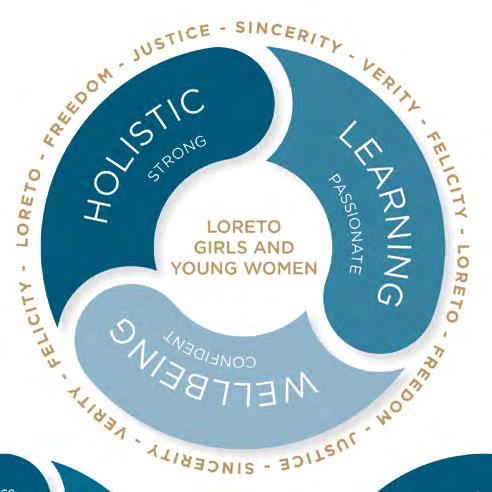
LEARNING AT LORETO COLLEGE
MARRYATVILLE
> Welcome
> Mission and Values
> Educational Model
> Social, Emotional and Academic Development
> Subject Flow Chart
SUBJECT SELECTION:
> Year 7
> Year 8
> Year 9
> Year 10
The SEAD Program acknowledges the important integration between the Social, Emotional and Academic Development of girls. The integration of social-emotional skill development in conjunction with academic learning outcomes ensures that students develop holistically as resilient and confident girls and young women.
This targeted and sequential program acknowledges the phases of girls’ transition from childhood to adolescence to adulthood and the challenges and celebrations that accompany each stage of development.
During their stages of maturation, girls are not only developing their identity but also building the foundations upon which lay their future wellbeing and personal success. Thus, the SEAD Program is aimed at facilitating girls’ understanding of themselves as learners, responsible citizens and as positive friends, subsequently leading to personal achievement both at school and in life.
The SEAD Program will be delivered by teachers during dedicated weekly timetabled lessons as well as other out of the classroom learning experiences.
LEARNING AT
LORETO COLLEGE
MARRYATVILLE
> Welcome
> Mission and Values
> Educational Model
> Social, Emotional and Academic Development
> Subject Flow Chart
SUBJECT SELECTION:
> Year 7
> Year 8
> Year 9
> Year 10
Identity
Values
Emotions
Independence
Leadership and Voice
Friendship
Relationships
Learning
Academic Success
Online Engagement
Post School Readiness
Future Pathways
Celebrating being me
Applying my values in responsible decision making
Expanding my toolkit to respond to my emotions
Mastering my transition to secondary school
Maintaining my voice and exploring leadership
Building friendships
Broadening my relationships
Exploring my strengths as a learner
Developing effective study skills and planning for success
Applying safe practices and being respectful online
Expanding my financial and commercial literacy
Investigating future pathways
YEARS 9 & 10
Building Communities
Having a positive identity
Being true to my values through wise decision making
Developing self-regulation
Taking responsibility
Having a positive voice and stepping up to leadership
Accepting and respecting others
Understanding and constructing positive relationships
Becoming an autonomous learner
Applying effective study skills and striving for personal excellence
Understanding my online identity and engaging safely, positively and responsibly online
Being financially literate and planning for my future
Broadening my identity and understanding of my future
YEARS 11 & 12
Stepping into My Future
Shaping the woman I will become
Confirming my values through principled decision making
Applying self-regulation
Being self-directed
Believing in my voice and role modelling leadership
Celebrating others
Cultivating strong and healthy relationships
Demonstrating independence in my learning
Demonstrating self-efficacy as a learner and setting goals for my future
Modelling a positive self-image and being safe and responsible online
Demonstrating fiscal cognisance
Planning for my career and tertiary pathway
Note: Any Science subject may continue to any other year 11 science subject, with a minimum C grade.
LEARNING AT LORETO COLLEGE
MARRYATVILLE
> Welcome
> Mission and Values
> Educational Model
> Social, Emotional and Academic Development
> Subject Flow Chart
SUBJECT SELECTION:
> Year 7
> Year 8
> Year 9
> Year 10
Students in Year 7 at Loreto undertake a full year of study in each of the following areas:
> English
> Health and Physical Education
> Languages (Choice of: Chinese, French or Italian)
> Mathematics
> Science
> Spirituality and Meaning
Students undertake a semester of study in each of the following areas:
> Design and Digital Technologies
- Digital Technologies
- Food Technology
- Creative Technologies
> Humanities and Social Sciences
- History
- Geography
> The Arts
- Music
- Drama
- Visual Art
LEARNING AT LORETO COLLEGE
MARRYATVILLE
> Welcome
> Mission and Values
> Educational Model
> Social, Emotional and Academic Development
> Subject Flow Chart
SUBJECT SELECTION:
> Year 7
> Year 8
> Year 9
> Year 10
Subject Description:
Students develop foundational skills in computational thinking, problemsolving, and digital systems. They learn how to analyse real-world problems to design digital solutions. Students explore how digital systems work, while also building an understanding of cybersecurity, privacy, and responsible online behaviour. Through the exploration of programming language, students create, test, and refine solutions that meet user needs. The subject encourages creativity, collaboration, and ethical thinking, equipping students with the skills to navigate and contribute to an increasingly digital world.
Subject Description:
Students explore the role of food in society and develop practical skills to make healthy, safe, and sustainable food choices. The subject focuses on understanding food properties, preparation techniques, and the cultural, social, and environmental factors that influence food selection and production. Students investigate the impact of food choices on health and learn to plan and prepare nutritious meals using a variety of tools and equipment. They apply design thinking to create food solutions, develop safe and hygienic foodhandling practices, and consider sustainability and ethical food production. Through hands-on learning, students build confidence in the kitchen while developing critical thinking, time management, and collaborative skills that support lifelong health and wellbeing.
Subject Description:
Students explore how to design and create solutions by combining creative thinking with design skills. Students learn to use materials and digital systems to design practical solutions with a focus on sustainability and innovation. They explore different design contexts while developing skills in planning, testing, creating and managing projects. Students will learn to design and implement design solutions and use material and digital tools safely and responsibly. Students will be able to design, create, and evaluate solutions using both digital and physical technologies, while also building essential skills in collaboration, problem-solving, and design literacy.
LEARNING AT
LORETO COLLEGE
MARRYATVILLE
> Welcome
> Mission and Values
> Educational Model
> Social, Emotional and Academic Development
> Subject Flow Chart
SUBJECT SELECTION:
> Year 7
> Year 8
> Year 9
> Year 10
Subject Description:
The Year 7 English curriculum is built around the three interrelated strands of language, literature and literacy. Learning in English builds on concepts, skills and processes developed in earlier years, and teachers will revisit and strengthen these as needed. Students will develop their understanding of a range of texts through shared studies which include prose, film, short stories, poetry and media. Students will be expected to maintain a program of independent reading.
Throughout Year 7 English, students will develop their analytical skills by considering the language techniques used by authors. Students will continue to develop their understanding of spelling, vocabulary and punctuation use.
Students engage with a variety of texts for enjoyment. They listen to, read, view, interpret, evaluate and
perform a range of spoken, written and multimodal texts in which the primary purpose is aesthetic, as well as texts designed to inform and persuade. Students develop their understanding of how texts are influenced by context, purpose and audience. They will continue to develop editing skills as a means of improving their work.
Students will have the opportunity to create a range of texts. The range of texts which could be created include imaginative, informative, persuasive texts, procedures, performances, reports and discussions. Students will also begin to create literary analyses and transformations of texts.

LEARNING AT
LORETO COLLEGE
MARRYATVILLE
> Welcome
> Mission and Values
> Educational Model
> Social, Emotional and Academic Development
> Subject Flow Chart
SUBJECT SELECTION:
> Year 7
> Year 8
> Year 9
> Year 10
Subject Description:
The Year 7 Health and Physical Education curriculum aims to empower students to understand and appreciate the value of being physically active and develop the motivation for making healthy life choices. Through participation in physical and health education students will develop knowledge, skills and attitudes that will contribute to a balanced and healthy lifestyle. Students will explore a variety of concepts that help foster an awareness of physical development and health perspectives, empowering them to make informed decisions and promoting positive social interaction.
Health and Physical Education focuses on both learning about and learning through physical activity. Both dimensions help students to develop their thinking, communication, social and self-management skills across the curriculum.
In Year 7 Health and Physical Education students participate in a range of practical units including but not limited to Athletics, Cricket, European Handball, Soccer and Netball. Students develop control and accuracy when performing specialised movement sequences and skills in each practical.
Students also participate in a Creative Dance unit where they apply the elements of movement to and perform movement sequences. Throughout the year students apply personal and social skills to establish and maintain respectful relationships and promote safety, fair play and inclusivity.
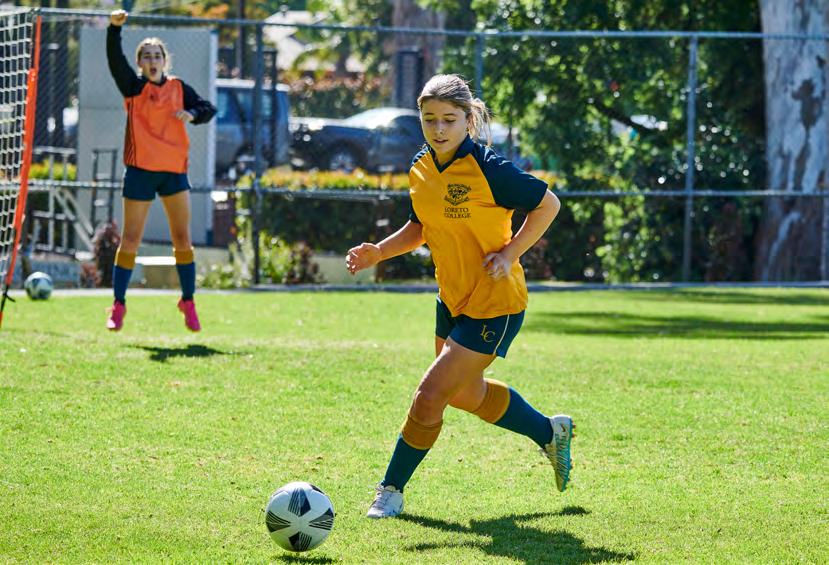
LEARNING AT LORETO COLLEGE
MARRYATVILLE
> Welcome
> Mission and Values
> Educational Model
> Social, Emotional and Academic Development
> Subject Flow Chart
SUBJECT SELECTION:
> Year 7
> Year 8
> Year 9
> Year 10
Subject Description:
In Year 7 History students study history from the time of the earliest human communities to the end of the ancient period, approximately 60 000 BC (BCE) –c.650 AD (CE).
The first unit of study is Deep time history of Australia where students learn about First Nations Australians and the world’s oldest continuing culture.
The second unit of study; the Ancient World includes the discoveries (the remains of the past and what we know) and the mysteries (what we do not know) about this period of history, in a range of societies from: Egypt, Greece, Rome or China. Students will simultaneously be addressing the key concepts, knowledge and understanding of Civics and Citizenship in these studies.
Students at Year Seven learn how to construct extended written responses and use referencing consistently in their work. Additionally, analytical skills are employed in the examination of primary and secondary sources. Historians’ opinions are also engaged in the process of writing insightful and balanced responses.
Subject Description:
Year 7 Geography embraces two units of study:
‘Water in the world’ focuses on water as an example of a renewable environmental resource. The unit develops students’ understanding of the concept of environment, including that the environment is the product of a variety of processes, supporting and enriching life.
‘Place and liveability’ focuses on the concept of place through an investigation of liveability. Students examine the services and facilities needed to support and enhance our lives, and that spaces are planned and managed by people. Students will also examine in context what it means to be a consumer, a worker and a producer in the market, and the relationships between these groups. Students explore the characteristics of successful businesses and consider how entrepreneurial behaviour contributes to business success.
LEARNING AT
COLLEGE MARRYATVILLE
> Welcome
> Mission and Values
> Educational Model
> Social, Emotional and Academic Development
> Subject Flow Chart
SUBJECT SELECTION:
> Year 7
> Year 8
> Year 9
> Year 10
Subject Description:
The Year 7 Chinese programme is designed to foster a love of learning languages. Students will be motivated to find out about life in China, the Asian Region and other Mandarin Speaking countries. They will begin to develop reading, writing, listening and speaking skills to give them ability to interact and communicate, exchange information, ideas and opinions about themselves and their everyday lives in a variety of social situations.
Students will begin to develop an awareness of pronunciation, rhythm and intonation as well as gaining competence in applying grammar rules and linguistic features. Engaging resources are designed to give students clear explanations and provide enjoyable, relevant and rewarding learning experiences.
Topics studied over the year include: Let’s get to know each other, What is your name?, My birthday is..., I have blue eyes, l love my family, I am Australian and Let’s celebrate the holidays together. Students will work towards skill development in the areas of Written and Oral Communication, Comprehension-written and spoken text, and Systems of Language, which includes grammar, vocabulary, tones and character systems.
Subject Description:
The Year 7 French programme is designed to foster a love of learning languages. Students will be motivated to find out about life in France and other French speaking communities. They will begin to develop reading, writing, listening and speaking skills to give them ability to interact and communicate, exchange information, ideas and opinions about themselves and their everyday lives in a variety of social situations.
Students will begin to develop an awareness of pronunciation, rhythm and intonation as well as gaining competence in applying grammar rules and linguistic features. Engaging resources are designed to give students clear explanations and provide enjoyable, relevant and rewarding learning experiences.
Topics studied over the year include: Bienvenue en France, An introduction to French: Mes Amis à Paris, Socialising and the City of Lights, Voici Ma Famille: Talking about family, Les Animaux: The world of animals, Bon Appétit: French dining and food shopping and C’est La Fête: French festivals and celebrations.
Students will work towards skill development in the areas of Written and Oral Communication, Comprehension-written and spoken text, and Systems of Language, which includes grammar, vocabulary and sound and writing systems.
LEARNING AT
LORETO COLLEGE
MARRYATVILLE
> Welcome
> Mission and Values
> Educational Model
> Social, Emotional and Academic Development
> Subject Flow Chart
SUBJECT SELECTION:
> Year 7
> Year 8
> Year 9
> Year 10
Subject Description:
The Year 7 Italian programme is designed to foster a love of learning languages. Students will be motivated to find out about life in Italy and other Italian speaking communities. They will begin to develop reading, writing, listening and speaking skills to give them ability to interact and communicate, exchange information, ideas and opinions about themselves and their everyday lives in a variety of social situations.
Students will begin to develop an awareness of pronunciation, rhythm and intonation as well as gaining competence in applying grammar rules and linguistic features. Engaging resources are designed to give students clear explanations and provide enjoyable, relevant and rewarding learning experiences.
Topics studied over the year include: Buongiorno e Benvenutii; An introduction to Italian, Mi piace la scuola; School life, Che famiglia simpatico; Family and Friends, and Gli Animali; The world of animals. Students will work towards skill development in the areas of Written and Oral Communication, Comprehension-written and spoken text, and Systems of Language, which includes grammar, vocabulary and sound and writing systems.
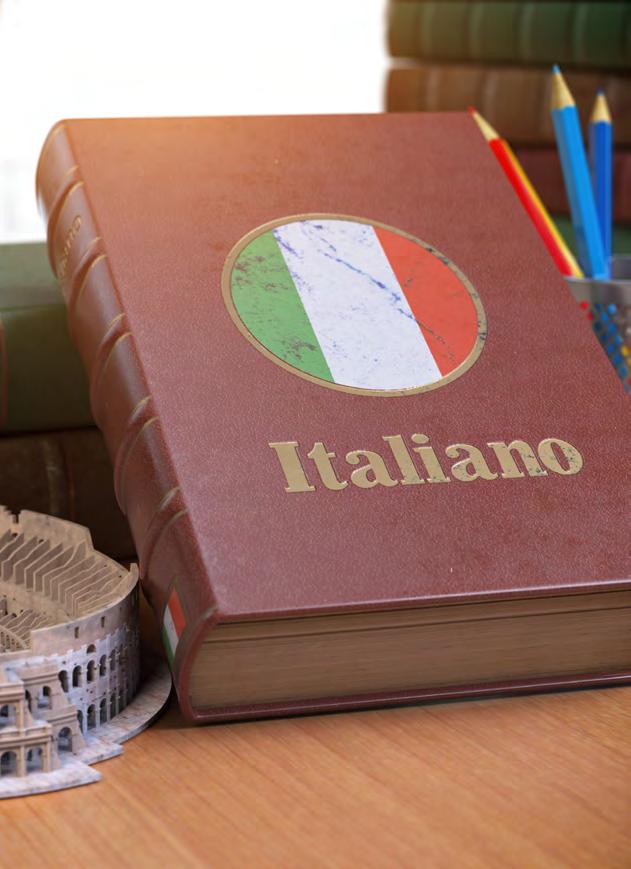
LEARNING AT
LORETO COLLEGE
MARRYATVILLE
> Welcome
> Mission and Values
> Educational Model
> Social, Emotional and Academic Development
> Subject Flow Chart
SUBJECT SELECTION:
> Year 7
> Year 8
> Year 9
> Year 10
Subject Description:
The Year 7 Mathematics curriculum comprises 6 core strands of Number, Algebra, Measurement, Space, Statistics and Probability. The learning is broken down into 7 units of work: Number Properties and Patterns, Geometry, Fractions, Decimals and Percentages, Statistics and Probability, Negative Numbers, Algebra and Measurement
Each unit is assessed with either a test or a mathematical investigation. There will be a total of 7 tests and 1 mathematical investigation across the year.
The mathematical investigation task is designed to familiarise students with similar tasks expected of students in their senior years of studying mathematics.
The learning takes place within targeted groups with classes running simultaneously.
Students are selected for each grouping based on the extensive data from previous reports,
external data and with their teacher feedback.
There is much flexibility for movement within these groups and the Mathematics faculty meet regularly to discuss student learning and placement within each group.
Any proposed movements within these groupings will be communicated to parents from the Leader of Mathematics. Within each group, the learning style and pace is tailored directly to
the requirements of the students. Some groups will cover a broader range of the curriculum where appropriate.
Teaching and learning is designed to build problem solving, reasoning and communication of mathematical concepts through investigations and rich learning tasks. Some students will be invited to participate in the Australian Mathematics Competition and may consider extension material beyond the curriculum.
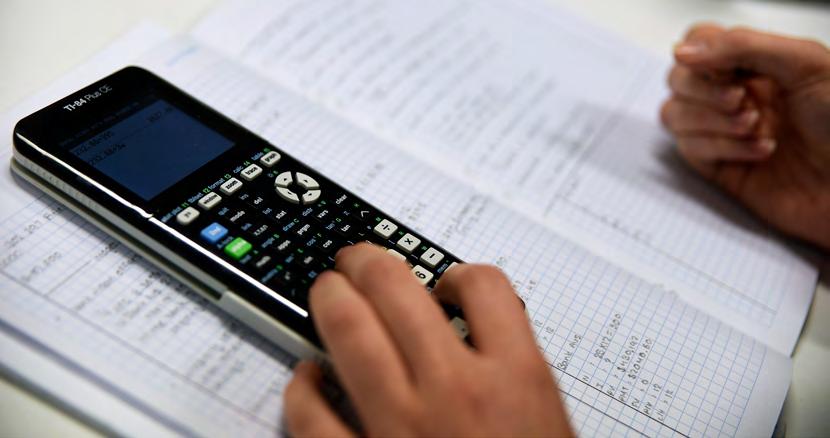
LEARNING AT LORETO COLLEGE
MARRYATVILLE
> Welcome
> Mission and Values
> Educational Model
> Social, Emotional and Academic Development
> Subject Flow Chart
SUBJECT SELECTION:
> Year 7
> Year 8
> Year 9
> Year 10
Subject Description:
In Year 7 Science students develop their scientific understanding through a range of guided inquiry activities designed to engage students and encourage exploration of science concepts. Students plan and conduct safe, reproducible investigations to test hypotheses and construct representations to organise and process data. They analyse data to identify patterns, trends and relationships and draw on evidence to support their conclusions.
Students explore the diversity of life on Earth and continue to develop their understanding of the role of classification in ordering and organising information. They use and develop models to represent and analyse the flow of energy and matter through ecosystems and explore the impact of changing components within these systems.
They consider the effects of multiple forces when explaining changes in an object’s motion and investigate relationships in the Earth-sun-moon system and use models to predict and explain events. They extend their understanding of the particulate nature of matter and explore how interactions of matter and energy at the sub-microscopic scale determine macroscopic properties.
Students begin to understand the relationship between science and society. They investigate how new evidence or different perspectives can lead to changes in scientific knowledge and develop their appreciation of the need for ethical and cultural considerations when acquiring data.
LEARNING AT
LORETO COLLEGE
MARRYATVILLE
> Welcome
> Mission and Values
> Educational Model
> Social, Emotional and Academic Development
> Subject Flow Chart
SUBJECT SELECTION:
> Year 7
> Year 8
> Year 9
> Year 10
Subject Description:
Spirituality and Meaning utilises a Religious Education Framework entitled Crossways which supports the integration of faith, life and culture and provides a clear curriculum framework for the development of teaching and learning within the Key Learning Area of Religious Education. The purpose of Religious Education is to deepen students’ understanding of the Catholic Tradition and to develop an appreciation of its significance in their lives, so that they may participate in the life of the Church and wider society.
Through the study of integrated topics, students develop skills in various approaches to, and methods of, investigating and analysing contemporary social issues. They become familiar with the limits and potential of these approaches and methods, and with the ethical
issues associated with them. The Crossways Wisdom (skills and dispositions) and Knowledge (enduring understandings) Strands propose ways by which we can live responsibly, reappraise our values, and develop a world consciousness influenced by Jesus’ life and the Loreto charism.
Students will study the following topics: Belonging; Prayer and Liturgy; Caring for the Earth; Identity and Relationships (Made in the image of God).
In each semester students demonstrate evidence of their learning through reflective reports, group activities and investigative research.
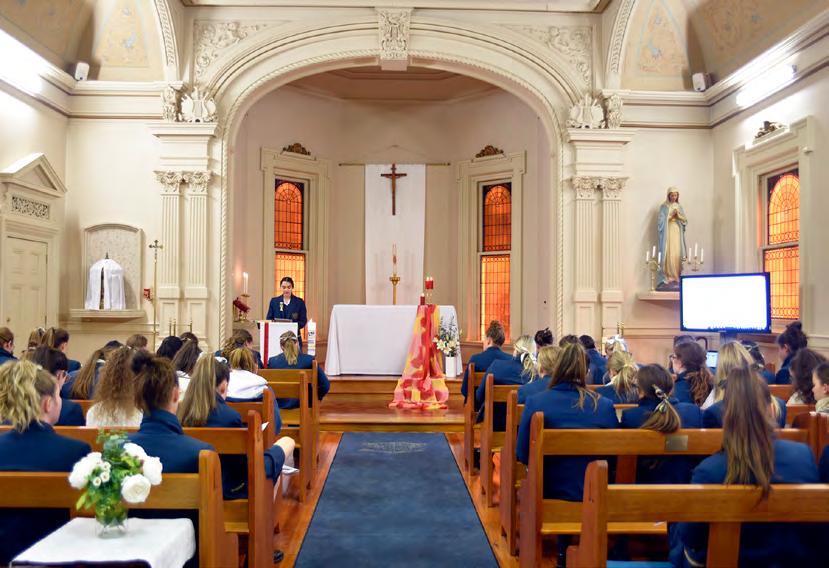
LEARNING AT
LORETO COLLEGE
MARRYATVILLE
> Welcome
> Mission and Values
> Educational Model
> Social, Emotional and Academic Development
> Subject Flow Chart
SUBJECT SELECTION:
> Year 7
> Year 8
> Year 9
> Year 10
Subject Description:
Year 7 students study Visual Art for one semester. The unit focus on applying knowledge of colour theory, in combination with the development of observation skills in drawing and painting media, equips students with the ability to make artworks and respond to artists’ works. Documenting progress and critically reflecting on learning are integral to the creative process. Knowledge of Visual Art terminology is developed primarily in the context of colour theory and by responding to works of art. This extends into the discussion of other formal art elements. Becoming familiar with the use of appropriate Visual Art terminology to demonstrate aesthetic and critical awareness is encouraged in verbal conversations, group discussions and in written responses.
Subject Description:
In Year 7 Music, students have an opportunity to discover and expand upon the basic elements of reading, writing and performing music. Through the study of how composers create music for film, students develop the skills to compose their own music for a short scene from a film. They experiment with different textures and techniques to convey emotion and themes. A preliminary level of music theory knowledge is attained, and practical instrumental skills are developed as students digitally record their compositions for the music in film topic.
Subject Description:
In Year 7 Drama, students build on their understanding of role, character and relationships. They use voice and movement to sustain character and situation and focus, tension, space and time to enhance drama. They learn how to shape drama for audiences using narrative and non-narrative dramatic forms and production elements. They use forms and elements including voice, movement and situation to create drama. space and time, and tension as they make and respond to drama. They learn to maintain safety in dramatic play and interact with other actors.
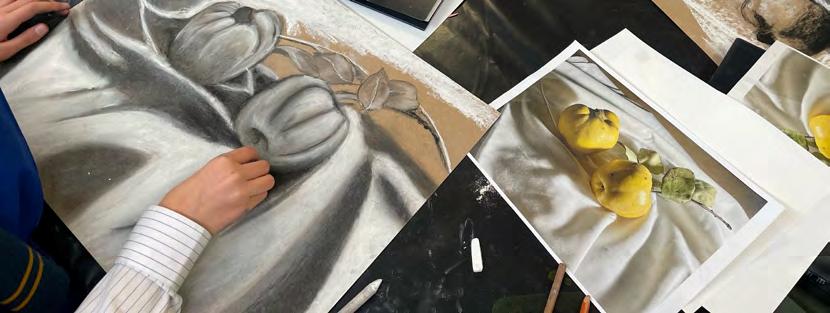
LEARNING AT
LORETO COLLEGE
MARRYATVILLE
> Welcome
> Mission and Values
> Educational Model
> Social, Emotional and Academic Development
> Subject Flow Chart
SUBJECT SELECTION:
> Year 7
> Year 8
> Year 9
> Year 10
Students in Year 8 at Loreto undertake a full year of study in each of the following areas:
> English
> Mathematics
> Languages (Choice of: Chinese, French or Italian)
> Science
> Spirituality and Meaning
> Health and Physical Education (This can be achieved by either choosing a full year of HPE or a semester of HPE and one of Netball*)
*Netball can only be selected by students who have prior playing experience at a club level. Any other students interested in Netball, who do not meet this criterion should contact Mrs Braddock for further discussion.
Students undertake a semester of study in each of the following areas:
> Health and Physical Education
> Humanities and Social Sciences
- History
- Geography
> Digital Design Solutions
In constructing the remainder of their course of study, students select from a wide range of subjects.
Subjects will run if there are sufficient students to form a class and is also dependent on staffing and timetable constraints.
Information about content in some subject outlines is to be considered as a guide only.
Students select two semesters of Arts subjects. Students select from the following options: Arts
Musical Theatre
Visual Art
Students select one semester of Technologies subject from the following options: Technologies Food
Creative Technologies
> Welcome
> Mission and Values
> Educational Model
> Social, Emotional and Academic Development
> Subject Flow Chart
SUBJECT SELECTION:
> Year 7
> Year 8
> Year 9
> Year 10
Subject Description:
Students build on their understanding of nutrition, food preparation, and sustainability. They investigate the nutritional needs of different groups, explore food media and marketing influences, and apply this knowledge to make informed, health-conscious food choices. Students further develop their practical skills in planning, preparing, and presenting a variety of meals, with an emphasis on food safety, hygiene, and efficient kitchen practices. They consider environmental and ethical factors in food production and consumption, including food waste and sustainable sourcing. By applying design thinking and working through the design process, students create and evaluate food solutions that meet specific needs. The course promotes independence, critical thinking, and collaboration, preparing students to make responsible food decisions in their daily lives.
Subject Description:
Students explore the design and creation of digital and practical solutions using a range of technologies. They build on skills in areas such as skills in planning, testing, creating and managing projects, while also engaging with materials and tools to develop innovative products. Through hands on projects, students learn to analyse problems, generate ideas, and apply creative processes to develop solutions that are functional, sustainable, and suited to real world needs. Students engage in both design and digital technologies to build a wellrounded understanding of how creativity and technology work together to solve problems.
Subject Description:
Students explore the principles and practices of designing digital solutions that effectively communicate ideas and solve problems. They learn to design, develop, and evaluate digital solutions by applying programming skills using general-purpose coding languages and exploring data representation and management techniques. They will also develop skills in using digital tools and software to create graphics and interactive media, applying design elements such as layout, colour, typography, and composition. Students learn to plan and manage projects through prototyping, while considering user needs, audience engagement, and accessibility. They also examine ethical issues related to digital content creation, including copyright, privacy, and digital citizenship. Through creative and collaborative projects, students build skills in critical thinking, creativity, and responsible digital citizenship, preparing them to navigate and contribute confidently to an increasingly digital world.
LEARNING AT LORETO COLLEGE
MARRYATVILLE
> Welcome
> Mission and Values
> Educational Model
> Social, Emotional and Academic Development
> Subject Flow Chart
SUBJECT SELECTION:
> Year 7
> Year 8
> Year 9
> Year 10
Subject Description:
The Year 8 English curriculum is built around the three interrelated strands of language, literature and literacy. Learning in English builds on concepts, skills and processes developed in earlier years, and teachers will revisit and strengthen these as needed.
In Year 8 English, students will study a range of texts which include prose, film, poetry and media, as well as having the opportunity to create their own texts. Students will be expected to maintain a program of independent reading. Students will extend their understanding of the techniques used by authors in a range of texts. They will be able to understand how features of texts indicate purpose and reflect target audience. Students will develop their analytical skills through the construction of more structured responses, such as essays.
Students will be challenged to select and use evidence to support their conclusions when discussing texts.
Students will have the opportunity to develop their public speaking skills. Through this form of assessment, students will learn the components required to create a
formal speech and develop an awareness of the skills necessary to engage an audience. There will be an opportunity for students to construct a variety of creative texts, such narratives, poems, letters or persuasive responses. Each of these opportunities will allow students to develop as language users.
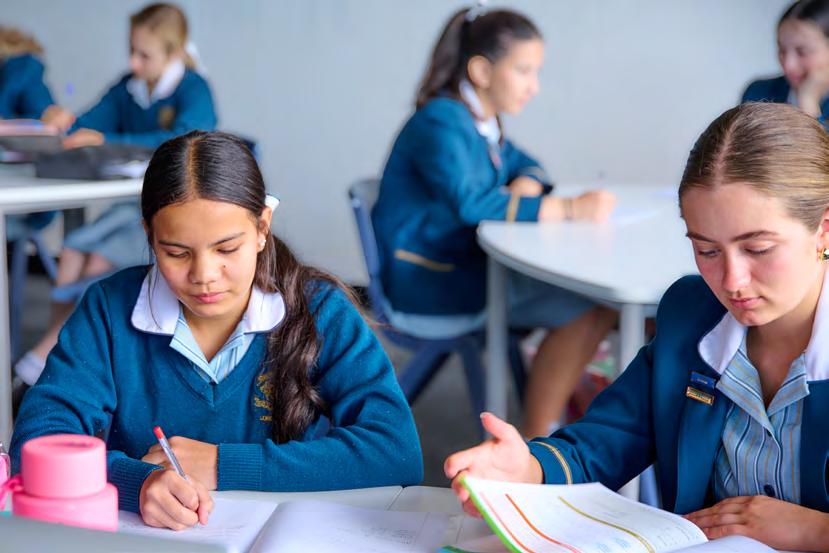
LEARNING AT LORETO COLLEGE
MARRYATVILLE
> Welcome
> Mission and Values
> Educational Model
> Social, Emotional and Academic Development
> Subject Flow Chart
SUBJECT SELECTION:
> Year 7
> Year 8
> Year 9
> Year 10
Subject Description:
The Year 8 Health and Physical Education curriculum aims to empower students to understand and appreciate the value of being physically active and develop the motivation for making healthy life choices. Through participation in physical and health education students will develop knowledge, skills and attitudes that will contribute to a balanced and healthy lifestyle. Students will explore a variety of concepts that help foster an awareness of physical development and health perspectives, empowering them to make informed decisions and promoting positive social interaction.
Health and Physical Education focuses on both learning about and learning through physical activity. Both dimensions help students to develop their thinking, communication, social and self-management skills across the curriculum.
In the Year 8 Health and Physical Education curriculum students will continue to refine their movement sequences and tactical awareness in units such as Athletics, Volleyball, Lacrosse, Touch and Softball. Students continue to compose and perform more complex movement sequences in the Gymnastics and Cultural dance units. Students will complete a unit on Drug Education and Harm Minimisation where they investigate strategies and practices that enhance their own, others and community health, safety and wellbeing.
Subject Description:
The Year 8 Netball subject is aligned to the Australian Curriculum and allows students to pursue their interest in netball. It aims to provide students with the opportunity to develop their netball potential and extend their knowledge of the game of netball.
Throughout the Year 8 Netball subject, emphasis is placed on skill development, and includes footwork, body movement, movement patterns, attacking, defending, passing skills, spatial awareness, and court movement. Students will also develop team related tactics, team plays, game strategies and communication skills.
Throughout the semester students will perform skills with efficiency, accuracy, and consistency. Individual’s technique will be analysed, refined, and practiced until the skills can be performed consistently during competition. To achieve this a variety of feedback will be used including video analysis of techniques and game play.
In addition to skill development students will develop an awareness of the importance of nutrition and how to prepare themselves for their performance. The subject is predominantly practical however specific theory work is also undertaken and includes positional plays, umpiring and nutrition.
LEARNING AT LORETO COLLEGE
MARRYATVILLE
> Welcome
> Mission and Values
> Educational Model
> Social, Emotional and Academic Development
> Subject Flow Chart
SUBJECT SELECTION:
> Year 7
> Year 8
> Year 9
> Year 10
Subject Description:
In Year 8 History, students complete two units of study.
Medieval Europe: This unit of study focuses on the roles and relationships in Medieval Europe and the experiences of and perspectives between rulers and subject peoples, and their interaction with power and authority. Interpretations of events, individuals, institutions and movements is also conducted. In addition to learning about social, economic, religious and political beliefs which were often challenged, students simultaneously address key concepts, knowledge and understanding of Civics and Citizenship with a particular focus on Magna Carta and the Peasants’ Revolt.
Khmer Empire: The second unit of study examines the Khmer Civilisation and analytical skills are employed in the examination of primary and secondary sources in understanding the significance of this extraordinary empire. The key social, political, religious, cultural and environmental features of the Khmer Empire are examined in detail.
In both units, students refine their ability to write extended well referenced responses. Additionally, analytical skills are employed in the examination of primary and secondary sources. The ability to use Historians’ opinions, debate and form clear concise conclusions substantiated by historical evidence are taught in a structured manner.
Subject Description:
In Year 8 Geography, students explore ‘Landforms and landscapes,’ which focuses on investigating geomorphology through a study of landscapes and their landforms. This unit examines the processes that shape individual landforms. They then explore ‘Changing nations’ investigating the changing human geography of countries, as revealed by shifts in population distribution. Internal and international migration patterns are also examined. Students will further develop their understanding of economics and business concepts by exploring the ways markets work within Australia, the participants in the market system and the ways they may influence the market’s operation.
Students at Year 8 engage in fieldwork and refine their skills of report writing. The ability to collect data and assess patterns of human activity using this data is an area of focus. The ability to use evidence to substantiate key findings is further extended at this year level.
LEARNING AT LORETO COLLEGE
MARRYATVILLE
> Welcome
> Mission and Values
> Educational Model
> Social, Emotional and Academic Development
> Subject Flow Chart
SUBJECT SELECTION:
> Year 7
> Year 8
> Year 9
> Year 10
Prerequisite for this subject: Year 7 Chinese
Subject Description:
The Year 8 Chinese Programme continues to be an interactive and engaging experience, suited to students from an array of backgrounds who wish to expand their horizons and become citizens of the world.
Students continue to learn to sustain interactions in a range of social and personal contexts, through a variety of current and relevant themes. Listening, speaking, reading and writing skills are further developed. An understanding of the social and cultural aspects of the language is incorporated. The complexity and variety of language, structures and grammar and exposure to a greater range of text types is extended. Engaging resources are designed to give students clear explanations and provide enjoyable, relevant and rewarding learning experiences.
Topics studied over the year include: this jacket is very fashionable, it’s raining, my dream holiday.
Students will continue to work towards skill development in the areas of Written and Oral Communication, Comprehension-written and spoken text, and Systems of Language, which includes grammar, vocabulary, tones and character systems.
Prerequisite for this subject: Year 7 French
Subject Description:
The Year 8 French Programme continues to be an interactive and engaging experience, suited to students from an array of backgrounds who wish to expand their horizons and become citizens of the world.
Students continue to learn to sustain interactions in a range of social and personal contexts, through a variety of current and relevant themes. Listening, speaking, reading and writing skills are further developed. An understanding of the social and cultural aspects of the language is incorporated.
The complexity and variety of language, structures and grammar and exposure to a greater range of text types is extended. Engaging resources are designed to give students clear explanations and provide enjoyable, relevant and rewarding learning experiences.
Topics studied over the year include: La Vie Scolaire - Life at school, Ma Vie Quotidienne - Daily routines and activities, Comment Sont-Ils ? - Describing people, La Mode - Shopping in France, Où est La Bibliothèque?Places around town and asking for directions - Vive Les Vacances - Holiday plans and expressing the weather. Students will continue to work towards skill development in the areas of Written and Oral Communication, Comprehension-written and spoken text, and Systems of Language, which includes grammar, vocabulary and sound and writing systems.
LEARNING AT
LORETO COLLEGE
MARRYATVILLE
> Welcome
> Mission and Values
> Educational Model
> Social, Emotional and Academic Development
> Subject Flow Chart
SUBJECT SELECTION:
> Year 7
> Year 8
> Year 9
> Year 10
Prerequisite for this subject: Year 7 Italian
Subject Description:
The Year 8 Italian Programme continues to be an interactive and engaging experience, suited to students from an array of backgrounds who wish to expand their horizons and become citizens of the world.
Students continue to learn to sustain interactions in a range of social and personal contexts, through a variety of current and relevant themes. Listening, speaking, reading and writing skills are further developed. An understanding of the social and cultural aspects of the language is incorporated. The complexity and variety of language, structures
and grammar and exposure to a greater range of text types is extended. Engaging resources are designed to give students clear explanations and provide enjoyable, relevant and rewarding learning experiences.
Topics studied over the year include: Cosa fai durante il weekend? - Leisure time, Di dove sono?Nationalities, countries and languages, Quale mezzo prendiamo? - Getting around Italy, Mangiare all’Italiana - Delights of Italian cuisine and eating out.
Students will continue to work towards skill development in the areas of Written and Oral Communication, Comprehension-written and spoken text, and Systems of Language, which includes grammar, vocabulary and sound and writing systems.
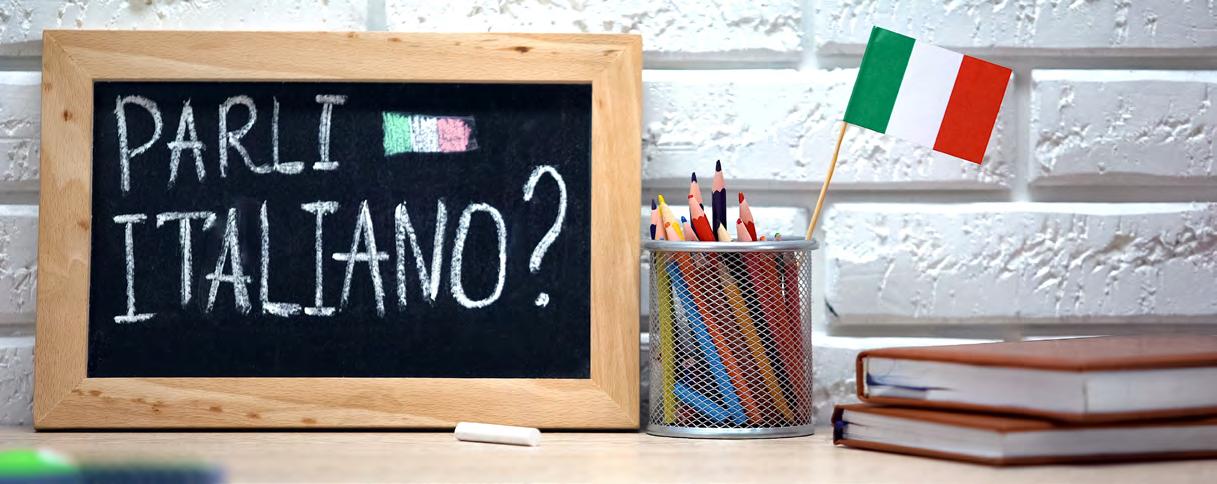
LEARNING AT LORETO COLLEGE
MARRYATVILLE
> Welcome
> Mission and Values
> Educational Model
> Social, Emotional and Academic Development
> Subject Flow Chart
SUBJECT SELECTION:
> Year 7
> Year 8
> Year 9
> Year 10
Subject Description:
The Year 8 Mathematics curriculum comprises 6 core strands of Number, Algebra, Measurement, Space, Statistics and Probability. The learning is broken down into 8 units of work, which are Number and Index Laws, Algebra, Linear Relationships, Percentages and Finance, Measurement, Geometry and Ratios, Probability and Data and Statistics. Each unit is assessed with either a test or a mathematical investigation. There will be 7 tests and 1 investigation task across the year. The mathematical investigation tasks are designed to promote success with similar tasks expected of students in senior years of studying mathematics.
The learning takes place within targeted groupings with classes running simultaneously. Students are selected for each grouping based on the extensive data from Maths Pathway, NAPLAN and PAT testing along with their teacher feedback.
There is flexibility for movement within these groupings and the Maths faculty meet regularly to discuss student learning and placement within each group. Any proposed movements within these groupings will be communicated to parents from the Leader of Mathematics.
Within each group, the learning style and pace is tailored directly to the requirements of the students.
Some groups will cover a broader range of the curriculum where appropriate. Teaching and learning is designed to build problem solving, reasoning and communication of mathematical concepts through investigations and rich learning tasks. Some students will be invited to participate in the Australian Mathematics Competition and may consider extension material beyond the curriculum.
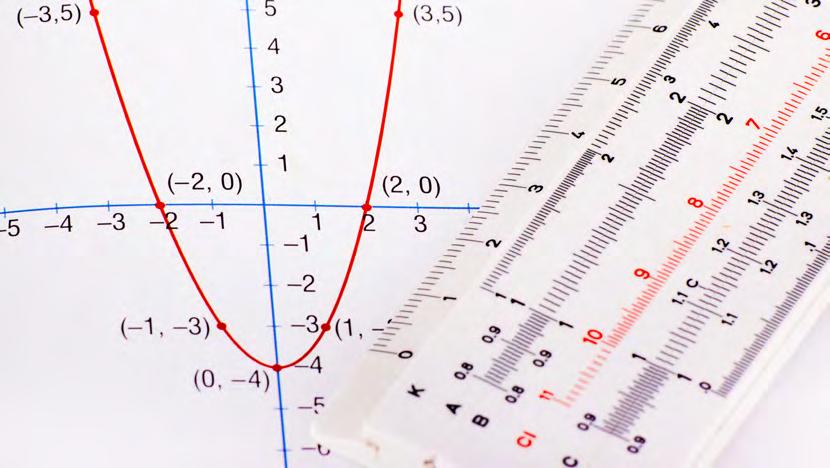
LEARNING AT
LORETO COLLEGE
MARRYATVILLE
> Welcome
> Mission and Values
> Educational Model
> Social, Emotional and Academic Development
> Subject Flow Chart
SUBJECT SELECTION:
> Year 7
> Year 8
> Year 9
> Year 10
Subject Description:
In Year 8 Drama, students further build on their understanding of role, character, relationships and human motivations. They use voice and movement to create believable and sustained characters in various situations. They incorporate language and ideas and use devices such as dramatic symbol to create dramatic action and extend mood and atmosphere in performance. Students learn how to shape drama for audiences using narrative and non-narrative dramatic forms and production elements such as lighting and sound. They learn that over time there has been further development of different traditional and contemporary styles of drama. They consider social, cultural and historical influences of drama in different forms and genres. Students evaluate the directors’ intentions and expressive skills used by actors in drama they view and perform. They learn to work in small and larger ensembles and interact with other performers in a respectful way.
Subject Description:
In Year 8 Music, students pursue a deeper understanding of music by focusing on two approaches: creative application and music literacy. They Identify and analyse how the elements of music are used in different styles. They Interpret, rehearse and perform music, demonstrating technical and expressive skills on their chosen instrument or voice. They use aural skills, music terminology and symbols to recognise, memorise and notate features of music compositions. Students in this subject are strongly encouraged to be undertaking individual tuition on either an instrument or the voice, and their practical performance skills are developed throughout the course.
Subject Description:
In Year 8 Musical Theatre, students will experience a holistic insight into the world of Musical Theatre. Through a mostly practical approach, students will develop creative application skills and theatre literacy skills. In creative application, they will develop and expand upon skills in Musical Theatre performance, including singing, dancing and acting in this genre. Students will gain skills in stagecraft and performance etiquette. For theatre literacy skills, they will learn technical production concepts in lighting, stage management, costume design and set/props design.
LEARNING AT
LORETO COLLEGE
MARRYATVILLE
> Welcome
> Mission and Values
> Educational Model
> Social, Emotional and Academic Development
> Subject Flow Chart
SUBJECT SELECTION:
> Year 7
> Year 8
> Year 9
> Year 10
Subject Description:
In Year 8 Science, students are introduced to cells as microscopic structures that explain macroscopic properties of living systems. They link form and function at an organ level and explore the organisation of a body system in terms of flows of matter between interdependent organs. They begin to classify different types of energy and describe the role of energy in causing change in systems, including the role of energy and forces in the geosphere. They learn to classify matter at the atomic level and distinguish between chemical and physical change. They understand that chemical reactions also involve energy.
Students explain how social, cultural and technological factors can influence development and application of scientific knowledge. They analyse scientific responses to contemporary issues and examine the importance of science communication.
Students plan and conduct safe, reproducible investigations to test relationships between components in systems. They select and construct appropriate representations to organise and process data and information. Students analyse data to identify patterns, trends, relationships and
anomalies and consider the magnitude of properties and use appropriate units to describe proportional relationships. They identify assumptions and sources of error when analysing methods. and construct evidence-based arguments to support conclusions.
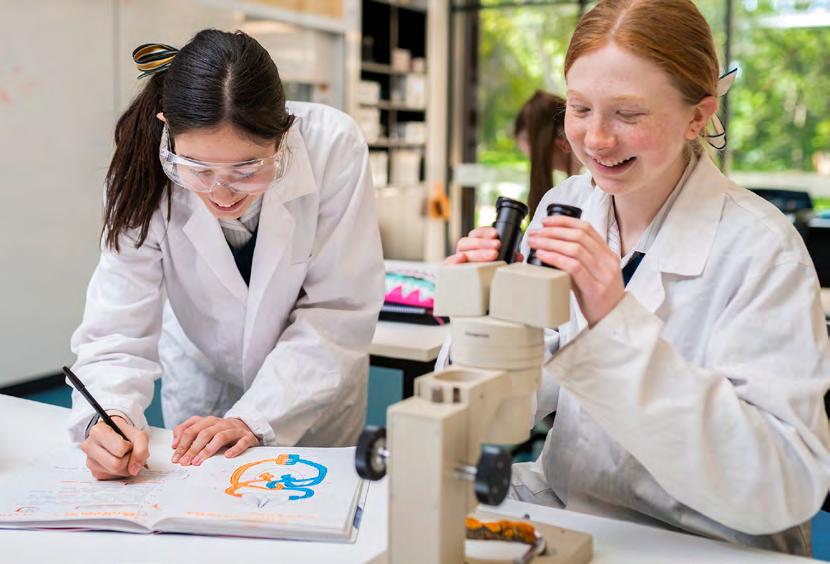
LEARNING AT
LORETO COLLEGE
MARRYATVILLE
> Welcome
> Mission and Values
> Educational Model
> Social, Emotional and Academic Development
> Subject Flow Chart
SUBJECT SELECTION:
> Year 7
> Year 8
> Year 9
> Year 10
Subject Description:
Spirituality and Meaning utilises a Religious Education Framework entitled Crossways which supports the integration of faith, life and culture and provides a clear curriculum framework for the development of teaching and learning within the Key Learning Area of Religious Education. The purpose of Religious Education is to deepen students’ understanding of the Catholic Tradition and to develop an appreciation of its significance in their lives, so that they may participate in the life of the Church and wider society.
Through the study of integrated topics, students develop skills in various approaches to, and methods of, investigating and analysing contemporary social issues. They become familiar with the limits and potential of these approaches and methods, and with the ethical issues associated with them. The Crossways Wisdom (skills and dispositions)
and Knowledge (enduring understandings) Strands propose ways by which we can live responsibly, reappraise our values, and develop a world consciousness influenced by Jesus’ life and the Loreto charism.
Students will study the following topics: Project Compassion; Jesus, then and Now; Serving Others; Journey (Made in the image of God).
In each semester students demonstrate evidence of their learning through reflective reports, group activities and investigative research.
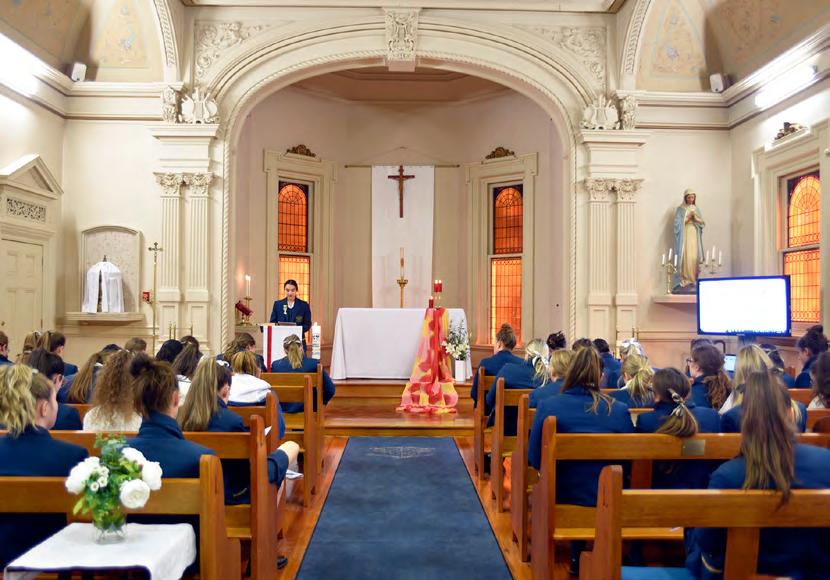
LEARNING AT
LORETO COLLEGE
MARRYATVILLE
> Welcome
> Mission and Values
> Educational Model
> Social, Emotional and Academic Development
> Subject Flow Chart
SUBJECT SELECTION:
> Year 7
> Year 8
> Year 9
> Year 10
Year 8 Visual Art
Subject Description:
In Year 8, all students study one semester of Visual Art. Students can choose to do a second semester to further their visual art learning. Different programs are devised for each semester.
The learning focus is on students acquiring technical skills, engaging with artists’ practice, and communicating concepts in their visual art practice.
The first stage of the course is teacher directed. Students are supported to develop and refine their technical skills. They work with a range of processes, media, and techniques. By studying the work of artists, students make connections which enhance their practice and understanding of how artists communicate meaning in works of art.
In the second half of the semester, students extend their thinking and use of conceptual skills. They employ critical and creative thinking processes to determine an artistic intention for a Major Practical Work.
The documentation of their creative process, critical and creative thinking, decision-making and reflections on learning is given equal emphasis as the production of a resolved work of art.
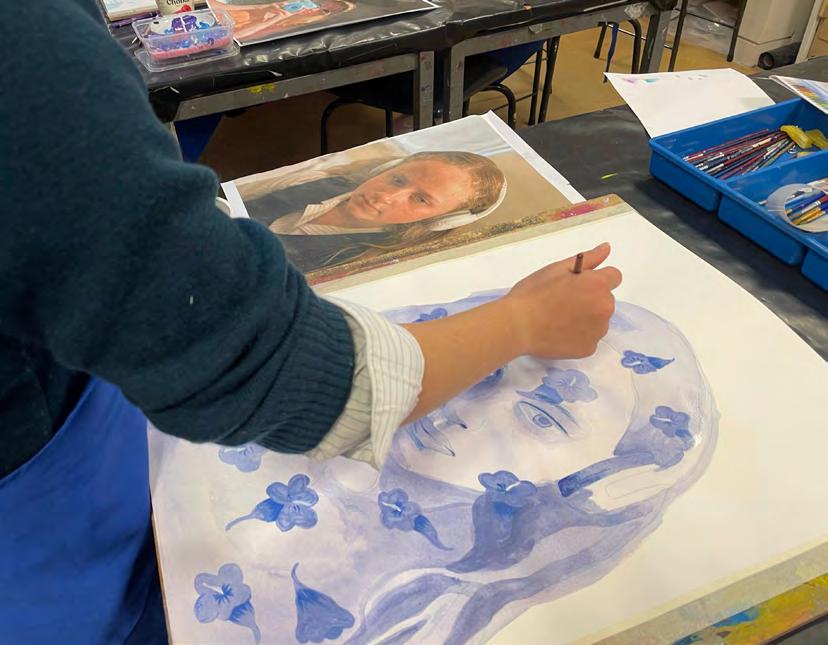
LEARNING AT
LORETO COLLEGE
MARRYATVILLE
> Welcome
> Mission and Values
> Educational Model
> Social, Emotional and Academic Development
> Subject Flow Chart
SUBJECT SELECTION:
> Year 7
> Year 8
> Year 9
> Year 10
Students in Year 9 at Loreto undertake a full year of study in each of the following areas:
> English
> Mathematics
> Science
> Spirituality and Meaning
> Health and Physical Education (This can be achieved by either choosing a full year of HPE or a semester of HPE and one of Netball)*
*Netball can only be selected by students who have prior playing experience at a club level or received a B grade or higher in Year 8 Netball. Any other students interested in Netball, who do not meet this criteria should contact Mrs Braddock for further discussion.
Students undertake a semester of study in each of the following areas:
> Humanities and Social Sciences
- History
- Our Planet, Our Economy
In constructing the remainder of their course of study, students select from a wide range of subjects. Subjects will run if there are sufficient students to form a class and is also dependent on staffing and timetable constraints. Information about content in some subject outlines is to be considered as a guide only. Students select four semesters from the following options:
Drama 1 or 2 semesters
Music 2 semesters
Musical Theatre 1 or 2 semesters
Visual Art 1 or 2 semesters
Food Technology 1 or 2 semesters
Digital Media and Design 1 or 2 semesters
Languages (Chinese, French or Italian) 2 semesters
LEARNING AT LORETO COLLEGE
MARRYATVILLE
> Welcome
> Mission and Values
> Educational Model
> Social, Emotional and Academic Development
> Subject Flow Chart
SUBJECT SELECTION:
> Year 7
> Year 8
> Year 9
> Year 10
Subject Description:
Students deepen their understanding of nutrition, food systems, and the impact of food choices on personal, community, and environmental health. They critically examine current food trends, cultural influences, and the role of technology and innovation in food production and preparation. Students extend their practical skills by planning and producing complex meals, applying advanced cooking techniques, and managing time and resources effectively. They evaluate the sustainability, cost, and nutritional value of their food solutions while considering issues such as food security, ethical food choices, and environmental impact. Through collaborative projects and the design process, students develop creative, informed, and responsible approaches to food, equipping them with lifelong skills for healthy and sustainable living.
Subject Description:
Students develop creative and technical skills to design, produce, and evaluate digital design projects. They explore a range of digital media forms such as graphic design, photography, and interactive media, learning how to use industry-standard software and tools effectively and safely. Students will expand their knowledge of digital systems, data management, and programming to design and create innovative digital solutions. They will apply this knowledge to design thinking, to plan and create media solutions that communicate ideas and messages for specific audiences and purposes. Ethical and responsible use of technology, including issues around privacy, intellectual property, and digital footprints, is also a key focus.
Through real-world problemsolving and collaborative projects, students build critical thinking, creativity, and technical confidence, preparing them for future pathways in digital innovation. This subject will support students to gain confidence to engage in the evolving digital media landscape and prepare for further study in digital communications and design.
LEARNING AT
LORETO COLLEGE
MARRYATVILLE
> Welcome
> Mission and Values
> Educational Model
> Social, Emotional and Academic Development
> Subject Flow Chart
SUBJECT SELECTION:
> Year 7
> Year 8
> Year 9
> Year 10
Subject Description:
The Year 9 English curriculum is built around the three interrelated strands of language, literature and literacy. Learning in English builds on concepts, skills and processes developed in earlier years, and teachers will revisit and strengthen these as needed. Students will study a range of texts which include prose, film, poetry and media, as well has having the opportunity to create their own texts. Students will be expected to continue with a program of independent reading.
Students will be challenged to extend their analytical skills by undertaking a comparative study of texts. Students engage with a variety of texts for enjoyment. They interpret, create, evaluate, discuss and perform a wide range of literary texts in which the primary purpose is aesthetic, as well as texts designed to inform and persuade.
In Year 9 English students will develop their analytical skills by considering the techniques used by authors and evaluating how techniques influence the response of the audience.
Students create a range of imaginative, informative and persuasive types of texts including
narratives, procedures, performances, reports, discussions, literary analyses, transformations of texts and reviews.
Through the development of their responses, students will be challenged to take calculated risks with vocabulary choices to extend them as language users.

> Welcome
> Mission and Values
> Educational Model
> Social, Emotional and Academic Development
> Subject Flow Chart
SUBJECT SELECTION:
> Year 7
> Year 8
> Year 9
> Year 10
Subject Description:
The Year 9 Health and Physical Education curriculum aims to empower students to understand and appreciate the value of being physically active and develop the motivation for making healthy life choices. Through participation in health and physical education students will develop knowledge, skills and attitudes that will contribute to a balanced and healthy lifestyle. Students will explore a variety of concepts that help foster an awareness of physical development and health perspectives, empowering them to make informed decisions and promoting positive social interaction.
Health and Physical Education focuses on both learning about and learning through physical activity. Both dimensions help students to develop their thinking, communication, social and selfmanagement skills across the curriculum.
In Year 9 students participate in several field and court sports, including Hockey, Ultimate Frisbee, Netball, AFL and SEPEP. During these unit’s students are required to apply criteria to make judgements about and refine their own specialised movement skills and movement performances. Students also explore the benefits of being physical activity, including mental, physical, and social, and investigate strategies to keep themselves and others safe.
Prerequisite:
Netball can only be selected by students with prior playing experience at a club level or received a B grade or higher in Year 8 Netball.
Subject Description:
The Year 9 Netball subject is aligned to the Australian Curriculum and allows students to pursue their interest in netball. It aims to provide students with the opportunity to develop their netball potential and extend their knowledge of the game of netball.
The subject is predominantly practical however specific theory work is also undertaken and includes sports psychology (goal setting, motivation, group dynamics and leadership), and prevention and management of injuries.
In the Year 9 Netball subject, emphasis is placed on skill development, and includes footwork, ball work, movement patterns, attacking, defending, passing skills, spatial awareness, and court movement. Students will also receive specialised instruction in their chosen position; mid court, shooting, circle defending or a combination.
Throughout the semester students will perform skills with efficiency, accuracy, and consistency. Technical and tactical development of individuals is a priority at this year level and will be achieved though video analysis and game statistics.
In addition to skill development students will develop an awareness of the concept of fitness, the specific demands of netball, the role of effective communication and how to prepare themselves for their performance.
> Welcome
> Mission and Values
> Educational Model
> Social, Emotional and Academic Development
> Subject Flow Chart
SUBJECT SELECTION:
> Year 7
> Year 8
> Year 9
> Year 10
Subject Description:
In Year 9 History, Students learn two units of study: Making and Transforming the Australian Nation (1750-1914)
In Year 9 History, students study the causes and effects of European Imperial expansion in the late 18th and early 19th centuries and the different responses to migration and colonisation. This will include specific study of the causes and effects of European contact with First Nations Peoples of Australia and the consequences of this interaction.
The second area of study is the First World War and the experience at the frontline and the Home Front. Students will also examine the role played by the Industrial Revolution in transforming societies. Civics and Citizenship will also be incorporated in the study of Federation, the Women’s vote and conscription in relation to the Great War.
Research skills and the ability to substantiate key conclusions using primary and secondary evidence will be further extended such as the investigation of Personal experiences/stories using War Service Records held at the National Archives.
Essay writing skills and source analysis skills are also extended through the examination of primary and secondary sources relating to both units of study.
Subject Description:
The ‘Our World’ curriculum examines ‘Biomes and food security’ and focuses on investigating the role of the biotic environment and its role in food and fibre production. This unit examines the biomes of the world, their alteration and significance as a source of food and fibre, and the environmental challenges and constraints. ‘Geographies of interconnections’ focuses on investigating how people, through their choices and actions, business and economics, are connected to places throughout the world and how these connections help to make and change environments and markets. This unit examines the interconnections between people and places through the products people buy and the effects of their production on the places that make them.
The ‘Our Economy’ curriculum gives students the opportunity to further develop their understanding of economics and business concepts by exploring the interactions within the global economy. Students are introduced to the concept of an ‘economy’ and explore what it means for Australia to be part of the Asia region and the global economy. They consider the interdependence of participants in the global economy, including the implications of decisions made by individuals, businesses, and governments. The responsibilities of participants operating in a global workplace are also considered.
LEARNING AT LORETO COLLEGE
MARRYATVILLE
> Welcome
> Mission and Values
> Educational Model
> Social, Emotional and Academic Development
> Subject Flow Chart
SUBJECT SELECTION:
> Year 7
> Year 8
> Year 9
> Year 10
Prerequisite for this subject:
Year 8 Chinese
Subject Description:
The Year 9 Chinese programme aims to further extend, develop and reinforce the knowledge and skills of students.
This is achieved through exposure to language where students are able to communicate both orally and in writing about immediate and personal interests and broader social and cultural interests. Students begin to develop capacity to express their points of view, give opinions and state preferences. Students build confidence, fluency and accuracy in pronunciation in extended conversation situations. The complexity and variety of language, structures and grammar and exposure to a greater range of text types is built upon. Engaging resources are designed to give students clear explanations and provide enjoyable, relevant and rewarding learning experiences.
Topics studied over the year include: I like swimming, and My school is especially good. Students will continue to work towards skill development in the areas of Written and Oral Communication, Comprehension-written and spoken text, and Systems of Language, which includes grammar, vocabulary, tones and character systems.
Prerequisite for this subject:
Year 8 French
Subject Description:
The Year 9 French programme aims to further extend, develop and reinforce the knowledge and skills of students.
This is achieved through exposure to language where students develop the ability to communicate both orally and in writing about immediate and personal interests and broader social and cultural interests. Students begin to develop capacity to express their
points of view, give opinions and state preferences. Students build confidence, fluency and accuracy in pronunciation in extended conversation situations. The complexity and variety of language, structures and grammar and exposure to a greater range of text types is built upon. Engaging resources are designed to give students clear explanations and provide enjoyable, relevant and rewarding learning experiences.
Topics studied over the year include: Chez Moi - Describing and comparing types of homes, Je me lève tôt - Daily routines at home, Le Passé Composé - Expressing the past tense, Le Futur ProcheExpressing the near future, and Faisons Les Courses - Shopping for food and fun.
Students will continue to work towards skill development in the areas of Written and Oral Communication, Comprehensionwritten and spoken text, and Systems of Language, which includes grammar, vocabulary and sound and writing systems.
LEARNING AT LORETO COLLEGE
MARRYATVILLE
> Welcome
> Mission and Values
> Educational Model
> Social, Emotional and Academic Development
> Subject Flow Chart
SUBJECT SELECTION:
> Year 7
> Year 8
> Year 9
> Year 10
Year 9 Italian
Prerequisite for this subject: Year 8 Italian
Subject Description:
The Year 9 Italian programme aims to further extend, develop and reinforce the knowledge and skills of students.
This is achieved through exposure to language where students develop the ability to communicate both orally and in writing about immediate and personal interests and broader social and cultural interests.
Students begin to develop capacity to express their points of view, give opinions and state preferences. Students build confidence, fluency and accuracy in pronunciation in extended conversation situations.
The complexity and variety of language, structures and grammar and exposure to a greater range of text types is built upon. Engaging resources are designed to give students clear explanations and provide enjoyable, relevant and rewarding learning experiences.
Topics studied over the year include: Mettiamoci in FormaHealth and Fitness, Casa Dolce Casa - Housing in Italy, Cosa Mi Metto? - Shopping and Fashion, and Come Festeggiamo il Fine Settimana? - Celebrating and Italian Festivals.
Students will continue to work towards skill development in the areas of Written and Oral Communication, Comprehensionwritten and spoken text, and Systems of Language, which includes grammar, vocabulary and sound and writing systems.
LEARNING AT LORETO COLLEGE
MARRYATVILLE
> Welcome
> Mission and Values
> Educational Model
> Social, Emotional and Academic Development
> Subject Flow Chart
SUBJECT SELECTION:
> Year 7
> Year 8
> Year 9
> Year 10
Subject Description:
The Year 9 Mathematics curriculum comprises 6 core strands of Number, Algebra, Measurement, Space, Statistics and Probability. The learning is broken down into 8 units of work, which are Index Laws and Finance, Algebra, Pythagoras and Trigonometry, Linear Relationships, Measurement and Geometry, Probability, Data Displays and Statistics and NonLinear Relationships. Each unit is assessed with either a test or a mathematical investigation. There will be 7 tests and 1 investigation task across the year. The mathematical investigation tasks are designed to promote success with similar tasks expected of students in senior years of studying mathematics.
The learning takes place within targeted groupings with classes running simultaneously. Students are selected for each grouping based on the extensive data from the previous year of learning, Maths Pathway,
NAPLAN and PAT testing along with their teacher feedback. There is flexibility for movement within these groupings and the Maths faculty meet regularly to discuss student learning and placement within each group. Any proposed movements within these groupings will be communicated to parents from the Leader of Mathematics.
Within each group, the learning style and pace is tailored directly to the requirements of the students.
Some groups will cover a broader range of the curriculum where appropriate. Teaching and learning is designed to build problem solving, reasoning and communication of mathematical concepts through investigations and rich learning tasks. Some students will be invited to participate in the Australian Mathematics Competition and may consider extension material beyond the curriculum.
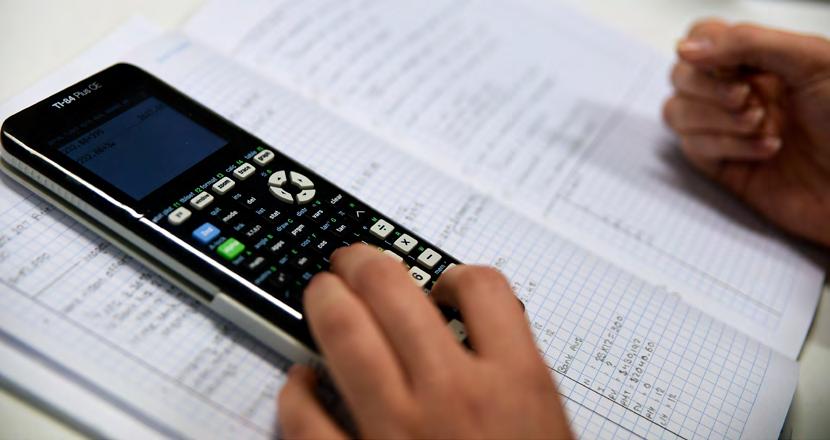
LEARNING AT LORETO COLLEGE
MARRYATVILLE
> Welcome
> Mission and Values
> Educational Model
> Social, Emotional and Academic Development
> Subject Flow Chart
SUBJECT SELECTION:
> Year 7
> Year 8
> Year 9
> Year 10
Subject Description:
Students refine and extend their understanding and use of role, character, relationships and situation. They learn how voice and movement can help sustain belief in character. Students experiment with mood and atmosphere and draw on drama from a range of cultures, times and locations. They learn that over time there has been further development of different traditional and contemporary styles of drama and that dramatists can be identified through the style of their work. They explore meaning and interpretation, forms and elements, and social, cultural and historical influences of drama. They evaluate actors’ success in expressing the directors’ intentions and the use of expressive skills in drama they view and perform. They work in small ensemble groups, learning leadership skills and interacting with other actors. This course builds on their understanding from previous years of the roles of artists and audiences as they engage with more diverse performances.
Subject Description:
Students pursue continue to develop and expand upon previously acquired skills in music studies. They gain a deeper understanding of music by focusing on two approaches; creative application and musical literacy. They Identify and analyse how the elements of music are used in different styles. They Interpret, rehearse and perform music, demonstrating technical and expressive skills on their chosen instrument or voice. They use aural skills, music terminology and symbols to recognise, memorise and notate features of music compositions. Students in this subject are expected to be undertaking individual tuition on either an instrument or the voice, and their practical performance skills are developed throughout the course. At year 9 level, Music is treated as a full year course and while students may elect to finish at the end of semester one, they are encouraged to complete the whole year of Year 9 Music if their intent is to continue studying music at year 10 level.
Subject Description:
Students will broaden their insight into the world of Musical Theatre. Through a mostly practical approach, students will develop creative application skills and theatre literacy skills. In creative application, they will expand upon skills in Musical Theatre performance, including singing, dancing and acting in this genre. Students will refine skills in stagecraft and performance etiquette. For theatre literacy skills, they will delve into technical production concepts in lighting, stage management, costume design and set/props design.
LEARNING AT
LORETO COLLEGE
MARRYATVILLE
> Welcome
> Mission and Values
> Educational Model
> Social, Emotional and Academic Development
> Subject Flow Chart
SUBJECT SELECTION:
> Year 7
> Year 8
> Year 9
> Year 10
Subject Description:
In Year 9, students consider the operation of systems at a range of scales and how those systems respond to external changes in order to maintain stability. They explore ways in which the human body system responds to changes in the external environment through physiological feedback mechanisms and the reproductive processes that enable a species to respond to a changing environment over time. They are introduced to the notion of the atom as a system of protons, electrons and neutrons, and how this system can change through nuclear decay. They learn that matter can be rearranged through chemical change and that these changes play an important role in many systems. They are introduced to the concepts of conservation of matter and energy and begin to develop a more sophisticated view of energy transfer. They explore these concepts as they relate to the global carbon cycle.
Students begin to consider how well a sample or model represents the phenomena under study and use a range of evidence to support their conclusions. Students explain the role of publication in validating scientific knowledge and describe the relationship between science, technologies and engineering. They examine key factors that influence interactions between science and society.
Students plan and conduct safe, reproducible investigations that generate and record repeatable data to test or identify relationships. They select and construct appropriate representations to organise, process and summarise data. Students analyse and connect data and information to identify and explain patterns, trends, relationships and anomalies. They analyse methods for assumptions and sources of error and evaluate the validity of conclusions and claims. They construct logical, evidencebased arguments to support conclusions or evaluate claims. They select and use content, language and text features to achieve their purpose when communicating their ideas, findings and arguments to specific audiences.
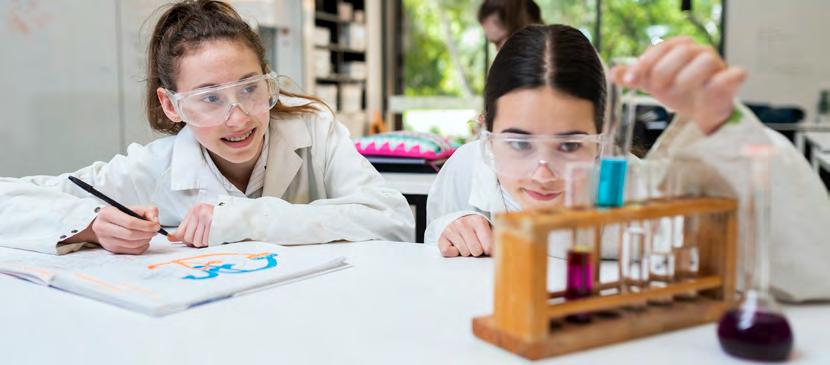
LEARNING AT
LORETO COLLEGE
MARRYATVILLE
> Welcome
> Mission and Values
> Educational Model
> Social, Emotional and Academic Development
> Subject Flow Chart
SUBJECT SELECTION:
> Year 7
> Year 8
> Year 9
> Year 10
Subject description:
Spirituality and Meaning utilises a Religious Education Framework entitled Crossways which supports the integration of faith, life and culture and provides a clear curriculum framework for the development of teaching and learning within the Key Learning Area of Religious Education. The purpose of Religious Education is to deepen students’ understanding of the Catholic Tradition and to develop an appreciation of its significance in their lives, so that they may participate in the life of the Church and wider society.
Through the study of integrated topics, students develop skills in various approaches to, and methods of, investigating and analysing contemporary social issues. They become familiar with the limits and potential of these approaches and methods, and with the ethical issues associated with them. The
Crossways Wisdom (skills and dispositions) and Knowledge (enduring understandings) Strands propose ways by which we can live responsibly, reappraise our values, and develop a world consciousness influenced by Jesus’ life and the Loreto charism.
Students will study the following topics: Sacred Texts; Healing and Hope; Wise Women Called Mary; Identity, Relationships and Stereotypes.
In each semester students demonstrate evidence of their learning through reflective reports, group activities and investigative research.
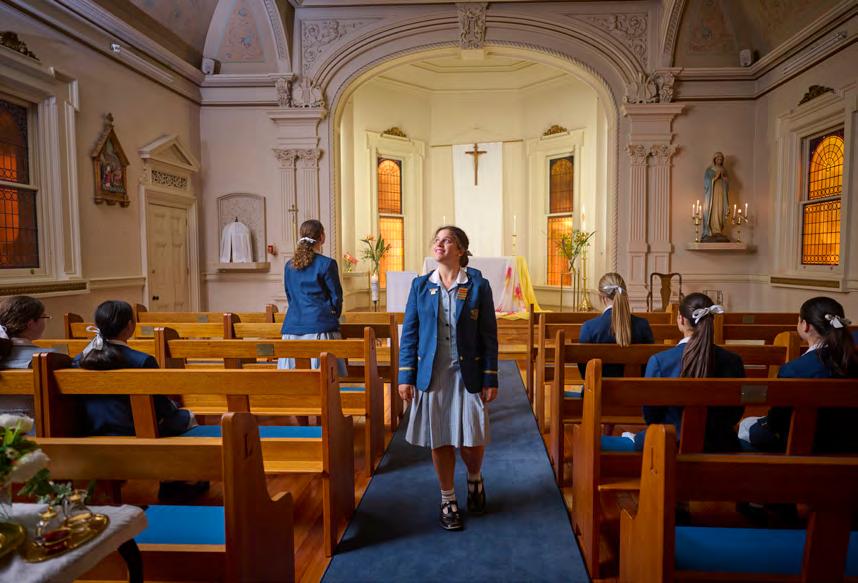
LEARNING AT
LORETO COLLEGE
MARRYATVILLE
> Welcome
> Mission and Values
> Educational Model
> Social, Emotional and Academic Development
> Subject Flow Chart
SUBJECT SELECTION:
> Year 7
> Year 8
> Year 9
> Year 10
9 Visual Art
Subject Description:
Year 9 students can elect to do either 1 or 2 semesters of Visual Art. Different programs are devised for each semester. The semester unit involves an in-depth exploration of a Unit Theme through a conceptual focus. Students are supported to develop critiquing strategies that reflect on themes and concepts encountered during the course. Communication of concept, skill acquisition and creative thinking are given equal emphasis. Skill acquisition through the exploration of style, technique and media is initiated in teacher directed practical exercises and developed further in a selfdirected approach. Independent research on global issues and artists’ practice support students to approach conceptualisation from a sound knowledge base. When determining an artistic intention for a Major Practical Work, students are encouraged to take risks when exploring ideas,
visualising alternatives, and devising innovative solutions.
Reflecting on learning, evaluating practical outcomes, documenting their progress and engagement with concepts and artists’ practice is a continuous process. Visual documentation supported by written annotations record the
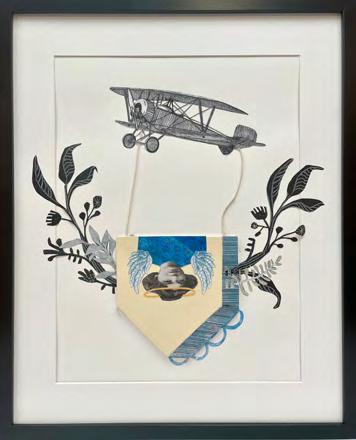
student’s creative thinking, reflections on learning, engagement with concepts and artists’ practice and evaluations of practical outcomes. Students demonstrate their learning and engagement with the Unit Theme and Conceptual Question in their Major Practical Work and Artist’s Statement.
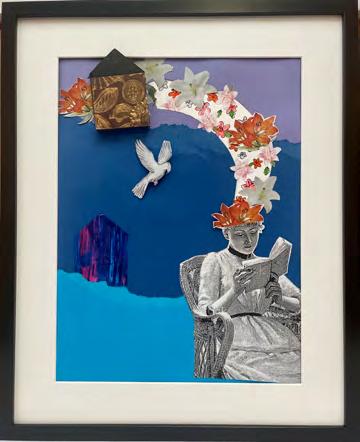
> Welcome
> Mission and Values
> Educational Model
> Social, Emotional and Academic Development
> Subject Flow Chart
SUBJECT SELECTION:
> Year 7
> Year 8
> Year 9
> Year 10
Students at Loreto College can select from a wide range of Year 10 subjects. Subjects will run if there are sufficient students to form a class and is also dependent on staffing and timetable constraints. Information about content in some subject outlines is to be considered as a guide only.
Students in Year 10 must undertake study in:
semesters
Students then select the equivalent of 6 semesters of study from the following options:
Religion and Meaning
semesters
semesters
semester
semester
and Physical Education
semesters
Students must undertake two semesters of Health and Physical Education. Students interested in the Specialist Netball subject must complete an Expression of Interest Form, as entry into the subject will be determined by a range of selection criteria outlined on Page 66. If successful, students will study one semester of Health and Physical Education and one of Netball.
and Power
Innovation in a Global Economy
or 2 semesters
or 2 semesters
AT
> Welcome
> Mission and Values
> Educational Model
> Social, Emotional and Academic Development
> Subject Flow Chart
SUBJECT SELECTION:
> Year 7
> Year 8
> Year 9
> Year 10
Subject Description:
Students apply advanced knowledge and skills to explore the complex relationship between food, health, society, and the environment. They investigate global food issues such as food security, sustainability, ethical food production, and the environmental impact of food systems. Students analyse food trends, nutrition and media, to make informed decisions as consumers and producers. Through the design process, they plan, produce, and evaluate nutritious meals that meet the needs of specific individuals or groups. Emphasis is placed on developing independence, creativity, and critical thinking as students apply advanced food preparation techniques, manage kitchen operations, and reflect on their practices. This subject prepares students to take active, responsible roles in shaping a sustainable and health-conscious food future.
Curriculum Pathways:
This subject leads to Stage 1 Food and Hospitality.
Subject Description:
Students extend their learning by engaging with more complex and specialised content that prepares them for further SACE food subjects. In addition to exploring sustainability, ethics, and global food systems, students may investigate topics such as food science and functional properties of ingredients, the influence of technology on food production, and emerging technologies in food design and innovation. They may also delve into the cultural significance of food, entrepreneurship in the food industry, and the development of food products for niche markets. Through inquiry-based projects, students research current food issues, experiment with recipe development, and analyse how consumer demands and global trends shape food innovation. This extended content encourages critical thinking, creativity, and informed decisionmaking, equipping students with valuable skills for future pathways as active food pathways as active food citizens.
Curriculum Pathways:
This subject leads to Stage 1 Food and Hospitality.
LEARNING AT
LORETO COLLEGE
MARRYATVILLE
> Welcome
> Mission and Values
> Educational Model
> Social, Emotional and Academic Development
> Subject Flow Chart
SUBJECT SELECTION:
> Year 7
> Year 8
> Year 9
> Year 10
Subject Description:
Students build advanced skills in creating and managing complex digital media projects. They will explore a variety of digital media formats, including graphics, interactive design, web development and user experience design, using professional software and technologies. Students apply design processes to develop innovative solutions that meet the needs of diverse audiences, focusing on aesthetics, functionality, and user experience. They critically analyse the impact of digital media on society, including ethical considerations such as intellectual property, representation, and digital wellbeing. Through individual and collaborative projects, students refine their technical skills, creativity, and project management, preparing them for further SACE studies in Digital Communication solutions.
Curriculum Pathways:
This subject leads to Stage 1 Design Technology and Engineering (Digital Communication Solutions).
Subject Description:
Students engage with advanced design and digital skills to develop innovative solutions that address real-world problems. They integrate knowledge from both Design and Technologies and Digital Technologies to create products and digital solutions that are functional, sustainable, and user focused. Students apply design thinking to investigate needs, generate ideas, and produce prototypes using a variety of materials and digital platforms. They deepen their understanding of design theory, considering ethical, environmental, and social impacts of design innovation. Through collaborative and individual projects, students enhance their creativity, critical thinking, and technical skills, preparing them for SACE studies in Industry and Entrepreneurial Solutions.
Curriculum Pathways:
This subject leads to Stage 1 Design Technology and Engineering (Industry and Entrepreneurial Solutions).
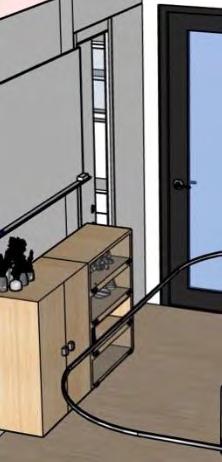
LEARNING AT
LORETO COLLEGE
MARRYATVILLE
> Welcome
> Mission and Values
> Educational Model
> Social, Emotional and Academic Development
> Subject Flow Chart
SUBJECT SELECTION:
> Year 7
> Year 8
> Year 9
> Year 10
Subject Description:
Students refine and extend their understanding and use of role, character, relationships and situation. They extend the use of voice and movement to sustain belief in character. Students learn how to maintain focus and manipulate space and time, language, ideas and dramatic action. They experiment with mood and atmosphere, use devices such as contrast, juxtaposition and dramatic symbol and modify production elements to suit different audiences. They draw on drama from a range of cultures, times and locations. Students learn that over time there has been further development of different traditional and contemporary styles of drama and that dramatists can be identified through the style of their work.
Students explore meaning and interpretation, forms and elements, and social, cultural and historical influences of drama as they make and respond to drama. They evaluate actors’ success in expressing the directors’ intentions and the use of expressive skills in drama they view and perform. They learn to maintain safety in drama and in interact with other actors in an ensemble setting. They build on their previous understanding of the roles of artists and audiences as they engage with more diverse performances.
Curriculum Pathways:
This subject leads to Stage 1 Drama.
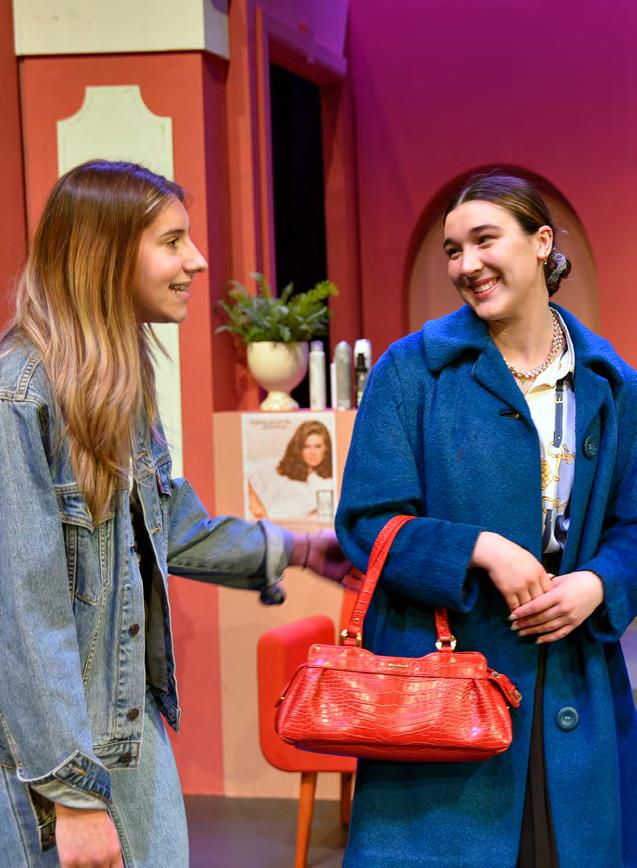
LEARNING AT LORETO COLLEGE MARRYATVILLE
> Welcome
> Mission and Values
> Educational Model
> Social, Emotional and Academic Development
> Subject Flow Chart
SUBJECT SELECTION:
> Year 7
> Year 8
> Year 9
> Year 10
Number of Credits: 10 credits
Subject Description:
The intention behind EIF is to assist students to recognise their individual strengths and see that the purpose and value of learning is much more than knowledge and grades.
Through EIF students will:
> Explore identity and belonging
> Develop agency
> Pursue and develop an area of interest that matters to them
In EIF students will lead their own learning and use a self-directed approach to move away from the old ‘what do you want to do’ and towards ‘who do you want to be.’
Assessment:
Stage 1 assessment is 100% schoolbased. Students demonstrate evidence of their learning through the following assessment types:
> Assessment Type 1: Exploring your past, present and future (50%)
> Assessment Type 2: Putting your capabilities into action (50%)
www.sace.sa.edu.au/innovating/revitalising-plp
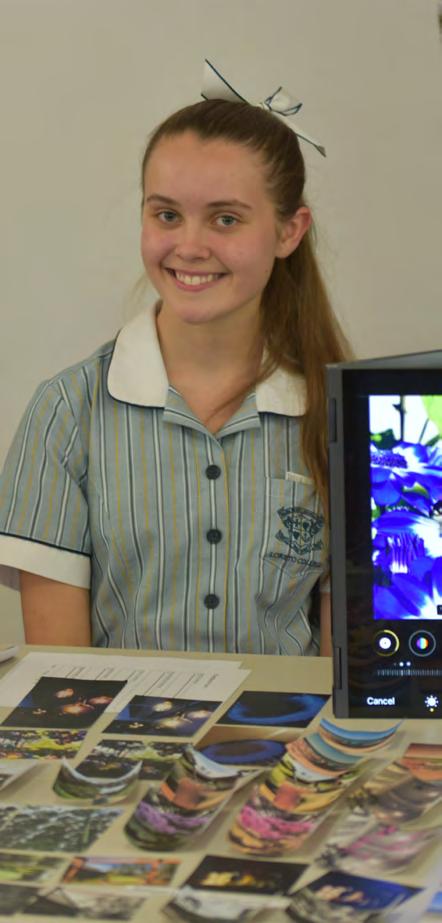
LEARNING AT
LORETO COLLEGE
MARRYATVILLE
> Welcome
> Mission and Values
> Educational Model
> Social, Emotional and Academic Development
> Subject Flow Chart
SUBJECT SELECTION:
> Year 7
> Year 8
> Year 9
> Year 10
Subject Description:
The English curriculum is built around the three interrelated strands of language, literature and literacy. Together, the strands focus on developing students’ knowledge, understanding and skills in listening, reading, viewing, speaking, writing and creating.
Students engage with a variety of texts; they interpret, create, evaluate and discuss a wide range of literary texts. The texts which may be studied in Year 10 English include media texts, film and digital texts, fiction, non-fiction, poetry, dramatic performances and multimodal texts.
Through the texts studied, students will have the opportunity to explore themes of human experience and cultural significance, interpersonal relationships, and ethical and global dilemmas within real-world and fictional settings.
In Year 10 English students evaluate how text structures can be used in innovative ways by different authors.
Students will learn about how the choice of language features, images and vocabulary contributes to the development of individual style. Students will develop their understanding about how the decisions made by an author impact on the response of the reader.
Students will have the opportunity to create a range of imaginative,
informative and persuasive types of texts including narratives, procedures, performances, reports, discussions, literary analyses, transformations of texts and reviews.
Curriculum Pathway(s):
This subject leads to Stage 1 English Literary Studies or Stage 1 English.
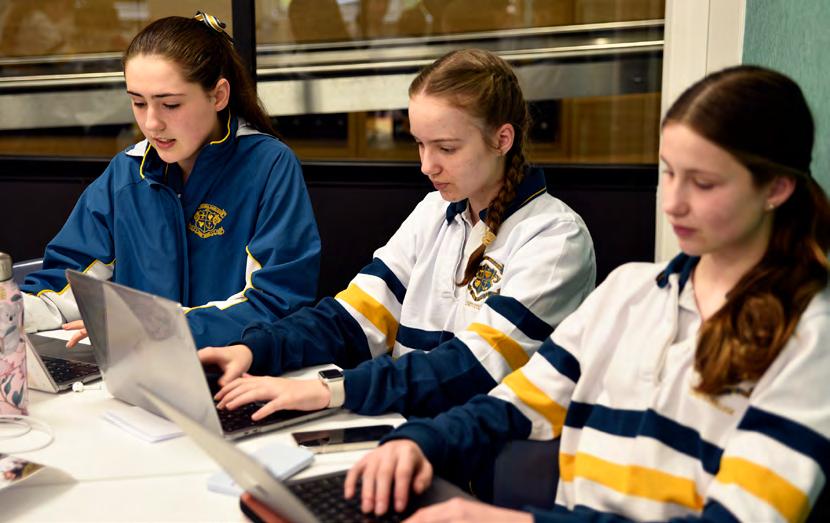
LEARNING AT
LORETO COLLEGE
MARRYATVILLE
> Welcome
> Mission and Values
> Educational Model
> Social, Emotional and Academic Development
> Subject Flow Chart
SUBJECT SELECTION:
> Year 7
> Year 8
> Year 9
> Year 10
Subject Description:
Health and Physical Education aims to facilitate the physical, mental and social development of students. Experiences in Health and Physical Education will provide both immediate and long term opportunities for students to develop skills and attitudes which promote physical, mental, social and emotional health.
Students will also develop a coherent set of personal and social values to which they commit themselves, including consideration for others, self discipline, acceptance of responsibility, self reliance and initiative.
Throughout the course students will participate in a range of physical activities while planning and evaluating various roles they can take in the community to develop their interests and assist others.
Students will be provided with various experiences throughout the school year. Unit selection can vary from year to year.
Possible units include: Practical:
Badminton, soccer, basketball, SEPEP, handball, self defence and volleyball. Health: Training methods and principles, and sports coaching.
Curriculum Pathways:
This subject leads to Stage 1 Physical Education.
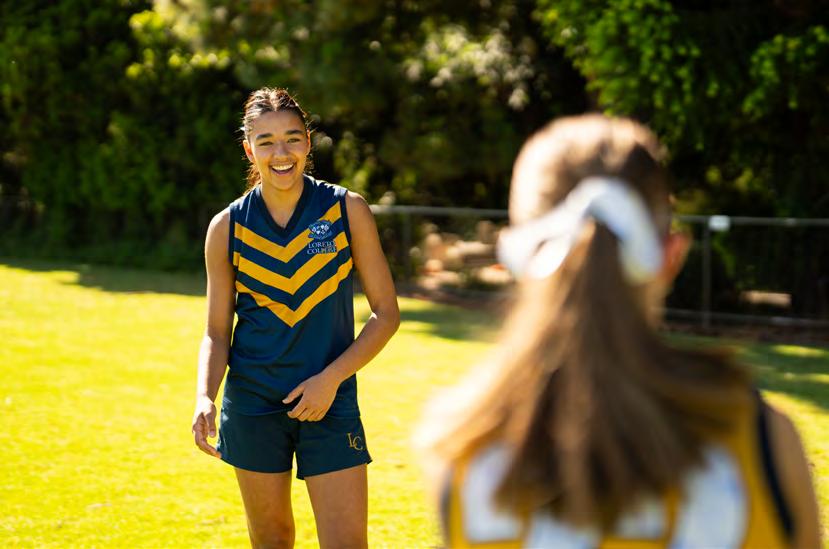
> Welcome
> Mission and Values
> Educational Model
> Social, Emotional and Academic Development
> Subject Flow Chart
SUBJECT SELECTION:
> Year 7
> Year 8
> Year 9
> Year 10
Prerequisite:
This subject runs in place of the compulsory PE subject at Year 10 and is open to students who demonstrate talent and potential in netball. To be a part of the Specialist Netball subject, students must fill an expression of interest. This subject runs for one semester.
Entry into the subject will be determined by a range of selection criteria including:
> A documented high level of ability and performance
> History of high standard (> B+) in Netball and or PE subject
> A high level of coachability
> Willingness to seek and accept a variety of feedback.
> A positive and enthusiastic attitude
> Professional in their sporting behaviours
> Play with intensity
> A member of a netball team (club or school) or a willingness to join a team.
> Willing to represent the College in the Knockout Netball competitions.
This subject is a demanding subject that requires students to be motivated and capable physically and academically.
Subject Description:
The subject is aligned to the Australian Curriculum and allows students who are talented in Netball and/or have the potential to play a high level of netball, the opportunity to learn and train with likeminded student, teachers, and coaches. It aims to extend these students by providing challenging training sessions and provide students with the opportunity to develop their netball potential.
The subject is predominantly practical; however, specific theory work is also undertaken, and includes coaching, sport psychology and prevention and management of injuries. Students will also participate in a Strength and Conditioning unit where they will perform individual and group strength and conditioning
programs specific to netball. At the end of the year students will also develop their coaching skills and attain the Foundation Coaching Accreditation.
In the practical sessions emphasis is placed on skill development, which includes footwork, ball work, movement patterns, clearing, attacking, defending, and passing. Students will also receive specialised instruction in their chosen position; mid court, shooting, circle defending or a combination. Technical and tactical development of individuals is a priority at this year level and will be achieved though video analysis and game statistics.
Curriculum Pathways:
This subject leads to Stage 1 Physical Education or Stage 1 Netball.
LEARNING AT LORETO COLLEGE MARRYATVILLE
> Welcome
> Mission and Values
> Educational Model
> Social, Emotional and Academic Development
> Subject Flow Chart
SUBJECT SELECTION:
> Year 7
> Year 8
> Year 9
> Year 10
Subject Description:
Students study the history of the modern world and Australia from 1918 to the present, with an emphasis on Australia in its global context. The transformation of the modern world during a time of political turmoil, global conflict and international cooperation provides a necessary context for understanding Australia’s development, its place within the Asia-Pacific region and its global standing.
Civics and Citizenship will also be addressed through case studies of the 1967 Referendum, Vietnam War conscription and the Wik and Mabo High Court cases.
This unit examines the causes of the Second World War in Europe and Asia. Students will examine the Holocaust, the use of the atomic bomb and the multiple factors which lead to the outbreak of this catastrophic war.
A second dimension of this unit is the study of the impact of the war on Australians and their nation. These include wartime measures, cultural diversity and the changes experienced by women and First Nations Australians.
Our second unit examines the civil rights movement in Australia. Key events, leaders and movements campaigning for First Nations Australians, migrants and Women’s rights and freedoms are examined in detail. Primary and Secondary sources are also examined through formative and summative assessment tasks. Furthermore, case studies of civil rights leaders are investigated through documentaries and their portrayal in modern films.
Curriculum Pathways:
This subject leads to Stage 1 Modern History: Empires and Superpowers, Stage 1 Modern History: Revolution and Resistance, Stage 1 Economics and Stage 1 Legal Studies.
LEARNING AT
LORETO COLLEGE
MARRYATVILLE
> Welcome
> Mission and Values
> Educational Model
> Social, Emotional and Academic Development
> Subject Flow Chart
SUBJECT SELECTION:
> Year 7
> Year 8
> Year 9
> Year 10
Subject Description:
‘People and Power,’ is a one semester course which permits students to conduct a combination of course work and their own research. Students will examine 20th and 21st Century global cultural history and associated movements, leaders, and events. Popular culture in fashion, music, art, architecture, and gender equality/diversity over the last 75 years are explored in the coursework. A focus is given to public and governmental reform and reaction to cultural change. When is a society progressive and liberal and when is it conservative and intransient?
A key aspect of this unit is the examination of ‘soft power,’ in creating social and political change. Can music, fashion or even sport cause a government to change policies and adopt reform?
Case studies include the role of music and sport influencing racial apartheid in South Africa through to K-Pop undermining Republican Party rallies in 2020.
Popular culture and the influence of technology from the advent of television to social media are also examined in being agents of change. Case studies of key moments in the evolution of Australian national identity are also examined in the film, fashion, television, and music industries.
A further area of study is a historical research investigation on any topic which has occurred since 1900. The 1,000 word or 6-minute multi-modal task can be conducted on any topic of the student’s interest. Primary and secondary sources are encouraged in this investigation and critical analysis of these sources welcomed.
Curriculum Pathways:
This subject leads to Stage 1 Modern History: Empires and Superpowers, Stage 1 Modern History: Revolution and Resistance and Stage 1 Legal Studies.
LEARNING AT LORETO COLLEGE
MARRYATVILLE
> Welcome
> Mission and Values
> Educational Model
> Social, Emotional and Academic Development
> Subject Flow Chart
SUBJECT SELECTION:
> Year 7
> Year 8
> Year 9
> Year 10
Subject Description:
Innovation in a Global Economy explores the ways in which individuals, communities, businesses, and governments make decisions regarding growth and well-being.
It enables students to understand the process of economic, business and government decision-making at a local, national, and global level and the future implications of these decisions.
Students learn to appreciate the interdependence of different economic sectors and develop the knowledge, understanding and skills that will inform and encourage them to participate in, and contribute to, the economy and a democratic society.
The key aims are to develop students’:
> Enterprising behaviours and capabilities that are transferable and contribute to the development and prosperity of society
> Understanding of the ways that society allocates limited resources to satisfy needs and wants
> Understanding of the business environments within the Australian economy and its interactions and relationships with the global economy
> Reasoning and interpretation skills to apply economics, business and legal concepts and theories to evaluate information they encounter, make informed decisions, and use problemsolving skills to respond to economics, business and political issues and events
> Understanding of economics, business and government decision-making and its role in creating a prosperous, sustainable, and equitable society for all Australians
> Knowledge, understandings, and skills that will enable them to participate actively and ethically in the local, national, and global economy as economically, politically, and business-literate citizens
Curriculum Pathways:
This subject leads to Stage 1 Business Innovation, Stage 1 Economics and Stage 1 Legal Studies.
LEARNING AT LORETO COLLEGE
MARRYATVILLE
> Welcome
> Mission and Values
> Educational Model
> Social, Emotional and Academic Development
> Subject Flow Chart
SUBJECT SELECTION:
> Year 7
> Year 8
> Year 9
> Year 10
Year 10 Chinese
Prerequisite for this subject: Year 9 Chinese
Subject Description:
The Year 10 Chinese Programme is an interactive and engaging experience, focused on students who are keen to build on their linguistic and grammatical knowledge acquired in Junior Secondary Language and continue to discover the cultural aspects of life in China, the Asian region and other Mandarin speaking countries. The course is suited to students who enjoy a challenge and want to have a rewarding and relevant experience while doing it. Chinese at Year 10 level is designed to prepare and build confidence in those students wishing to pursue Languages at Senior Secondary Level.
The Year 10 Chinese Programme follows Australian Curriculum requirements. The course continues to develop and enhance the confidence and capabilities of students and their ability to develop their language skills in the areas of writing, listening, reading and speaking. There is a strong focus on developing skills through the study of various text types, such as songs and film, enhancing grammatical knowledge and developing capacity in creative and personal writing. Students also spend time developing conversational skills.
Students will study various topics, including:
> Healthy lifestyle
> Chinese people’s food and drink
> My home is very comfortable
Curriculum Pathways:
This subject leads to Stage 1 Chinese (Continuers).
AT
> Welcome
> Mission and Values
> Educational Model
> Social, Emotional and Academic Development
> Subject Flow Chart
SUBJECT SELECTION:
> Year 7
> Year 8
> Year 9
> Year 10
Prerequisite for this subject:
Year 9 French
Subject Description:
The Year 10 French Programme is an interactive and engaging experience, focused on students who are keen to build on their linguistic and grammatical knowledge acquired in Junior Secondary Language and continue to discover the cultural aspects of life in France and various other French speaking communities. The course is suited to students who enjoy a challenge and want to have a rewarding and relevant experience while doing it. French at Year 10 level is designed to prepare and build confidence in those students wishing to pursue Languages at Senior Secondary Level.
The Year 10 French Programme follows Australian Curriculum requirements. The course continues to develop and enhance the
confidence and capabilities of students and their ability to develop their language skills in the areas of writing, listening, reading and speaking. There is a strong focus on developing skills through the study of various text types, such as songs and film, enhancing grammatical knowledge and developing capacity in creative and personal writing. Students also spend time developing conversational skills.
Students will study various topics, including:
This unit will focus on sports and other physical activities, and the ability to discuss health issues. Stress and other mental health issues which affect young French people are also touched upon.
This unit will focus on personal relationships and friendships. The 14-25 year-old generation in France
is looked at, as well as the effect of technology on our interpersonal relationships with others.
À bas la pollution!
L’environnement et notre planète - Down with pollution! The Environment and our planet
This unit will focus on environmental issues in the world today, with a particular focus on France’s contribution to sustainability.
L’avenir - The future
This unit will focus on hopes and ambitions for the future and possible career paths. The past and present nature of employment in France is examined, in addition to the evolution of women’s roles in the workforce and how the French language has changed because of it.
Curriculum Pathways:
This subject leads to Stage 1 French (Continuers).
LEARNING AT LORETO COLLEGE MARRYATVILLE
> Welcome
> Mission and Values
> Educational Model
> Social, Emotional and Academic Development
> Subject Flow Chart
SUBJECT SELECTION:
> Year 7
> Year 8
> Year 9
> Year 10
Year 10 Italian
Prerequisite for this subject:
Year 9 Italian
Subject Description:
The Year 10 Italian Programme is an interactive and engaging experience, focused on students who are keen to build on their linguistic and grammatical knowledge acquired in Junior Secondary Language and continue to discover the cultural aspects of life in Italy. The course is suited to students who enjoy a challenge and want to have a rewarding and relevant experience while doing it. Italian at Year 10 level is designed to prepare and build confidence in those students wishing to pursue Languages at Senior Secondary Level.
The Year 10 Italian Programme follows Australian Curriculum requirements. The course continues to develop and enhance the confidence and capabilities of students and their ability to
develop their language skills in the areas of writing, listening, reading and speaking. There is a strong focus on developing skills through the study of various text types, such as songs and film, enhancing grammatical knowledge and developing capacity in creative and personal writing. Students also spend time developing conversational skills.
including:
This unit will focus on discussing holiday experiences and learning about where Italians spend their vacations and what they do for fun.
This unit will focus on learning about Italian migration to Australia- both historical and modern-day and hearing about the stories of Italian immigrants.
Amore e Amicizia - Friendships and Love
This unit will focus on learning to discuss personal qualities in friends and relationships.
Cosa farò nel futuro? What shall I do in the future?
This unit will focus on future plans, with regards to senior high school and further education-options. The Italian, ‘scuola superiore’ system is also studied and compared to the Australian model. The theme of the world of work and occupations is also touched upon.
Curriculum Pathways:
This subject leads to Stage 1 Italian (Continuers).
LEARNING AT LORETO COLLEGE
MARRYATVILLE
> Welcome
> Mission and Values
> Educational Model
> Social, Emotional and Academic Development
> Subject Flow Chart
SUBJECT SELECTION:
> Year 7
> Year 8
> Year 9
> Year 10
Subject Description:
This course is designed to provide students with the foundations to study either Stage
1 General Mathematics or Stage 1 Mathematical Methods in Year 11.
In this course, students will study the units of Linear Relationships, Bivariate Statistics, Measurement, Trigonometry, Index Laws, Exponential Equations and Finance, Data Displays, Probability and Networks.
This course aims to build on students’ current algebraic foundations. Starting with linear algebra, the students will learn how to rearrange formulae, solve equations, and plot straight lines. They will develop their algebraic techniques further through the study of simultaneous equations and algebraic fractions.
As the course progresses, the students will learn how to factorise and solve a variety of quadratic equations. Through the study of these topics, students will learn the properties of a variety of functions and how to graph them using their key features.
Students study simple and compound interest in financial contexts such as savings accounts and making loan repayments. This equips the students with some practical financial skills, whilst also providing a foundation for the financial topics studied in Stage 1 General Mathematics.
Through the topic of Measurement, both Trigonometry and Pythagoras Theorem are used to calculate surface area and volumes for a variety of real-life problems.
Further topics studied are the probability of two and three-step experiments, and statistics. Here students will study a variety of techniques, such as probability tree diagrams, Venn diagrams and the normal distribution.
Curriculum Pathways:
This subject leads to Stage 1 General Mathematics or Stage 1 Mathematical Methods.
LEARNING AT
LORETO COLLEGE
MARRYATVILLE
> Welcome
> Mission and Values
> Educational Model
> Social, Emotional and Academic Development
> Subject Flow Chart
SUBJECT SELECTION:
> Year 7
> Year 8
> Year 9
> Year 10
Subject Description:
This course is designed to provide students with the foundations to study either Stage 1 Mathematical Methods or Stage 1 Specialist Mathematics. It is also possible to study Stage 1 General Mathematics following the completion of this course.
Students are selected for the 10A course based on both their Year 9 Mathematics achievement and teacher recommendation.
The 10A course is an extension class that aims to cover the same content as in the standard Year 10 course along with some further content from the Year 10A Mathematics curriculum.
This course will involve substantial algebra. Whilst still developing students’ knowledge of algebra from linear equations through to quadratics, some further techniques will be studied.
Students will learn how to complete the square, use the quadratic equation and use a variety of factorisation techniques. They will be expected to use these techniques to derive key properties of a function. Larger polynomial equations such as cubic and quartic equations may also be studied.
Students on this course will look at more challenging algebraic topics such as logarithms, surds and indices. They will develop their knowledge of exponential equations and look to use techniques learnt to solve and graph exponential equations. Students will build their knowledge of a range of further fundamental relations such as rational functions, hyperbolic functions and equations of circles.
Students will also look at some further trigonometric topics such as non-right-angled trigonometry, solving trigonometric equations and plotting trigonometric functions.
Curriculum Pathways:
This subject leads to Stage 1 General Mathematics, Stage 1 Mathematical Methods or Stage 1 Specialist Mathematics.
LEARNING AT LORETO COLLEGE
MARRYATVILLE
> Welcome
> Mission and Values
> Educational Model
> Social, Emotional and Academic Development
> Subject Flow Chart
SUBJECT SELECTION:
> Year 7
> Year 8
> Year 9
> Year 10
Number of Credits:
10 credits per semester
Pre-requisites: Nil
Subject Description:
Essential Mathematics offers students the opportunity to extend their mathematical skills in ways that apply to practical problemsolving in everyday and workplace contexts. Students apply their mathematics to diverse settings, including everyday calculations, financial management, business applications, measurement and geometry, and statistics in social contexts. In Essential Mathematics there is an emphasis on developing students’ computational skills and expanding their ability to apply their mathematical skills in flexible and resourceful ways. This subject is intended for students planning to pursue a career in a range of trades or vocations.
Content:
Students will undertake Stage 1 Essential Mathematics through some of the following topics:
> Calculations, time, and ratio
> Earning and spending
> Geometry
> Data in context
> Measurement
> Investing
> Open topic
Assessment:
Stage 1 assessment is 100% schoolbased. Students demonstrate evidence of their learning through four assessments comprising the following assessment types:
> Assessment Type 1: Skills and Applications Tasks (50%)
> Assessment Type 2: Folio Tasks (50%)
LEARNING AT
LORETO COLLEGE
MARRYATVILLE
> Welcome
> Mission and Values
> Educational Model
> Social, Emotional and Academic Development
> Subject Flow Chart
SUBJECT SELECTION:
> Year 7
> Year 8
> Year 9
> Year 10
Subject Description:
In this course, students present creative works such as instrumental/vocal performance and composition/arranging. Typically, students will develop their practical skills on an instrument or voice during weekly instrumental tuition time. This culminates in a live practical performance towards the end of each term. Students also use computer software to create arrangements and compositions.
Students also extend their knowledge of music through literacy tasks such as theory, applied theory and contextual investigations. Regular skills development takes place each week in both written theory and aural work. Musical styles and history is covered through contextual study and assignment tasks.
Assessment involves performance on an instrument or voice to a live audience in conjunction with written critique/evaluation and responding. Assessment in this subject may include written and multi-modal presentations, live performance, arranging/
composition using music software, theory, applied theory (aural), composition and arranging tasks.
Curriculum Pathways:
This subject leads to Stage 1 Music Advanced or Music Experience.
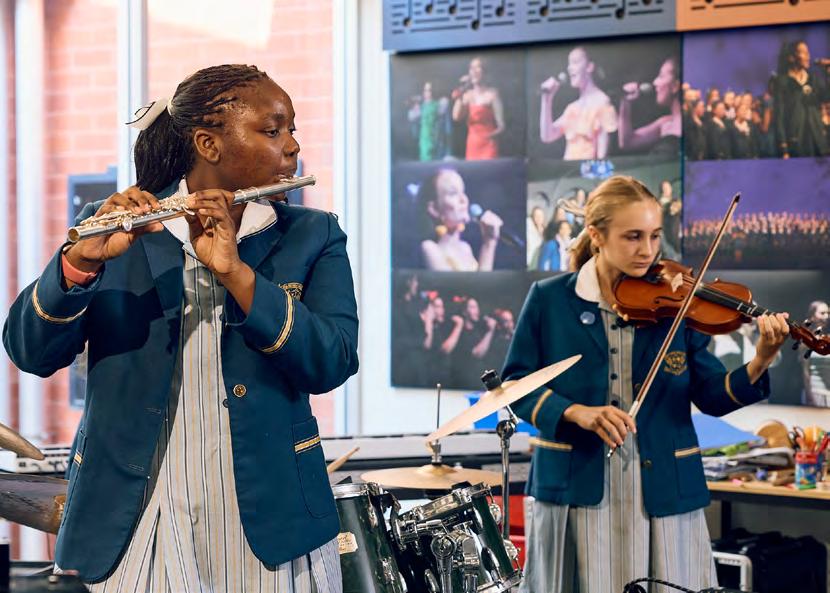
LEARNING AT
LORETO COLLEGE
MARRYATVILLE
> Welcome
> Mission and Values
> Educational Model
> Social, Emotional and Academic Development
> Subject Flow Chart
SUBJECT SELECTION:
> Year 7
> Year 8
> Year 9
> Year 10
Subject Description:
In this course, students will develop a more sophisticated understanding of atomic theory to understand patterns and relationships within the Periodic Table. They will study chemical bonding in a range of substances and explore different types of chemical reactions that are used to produce a range of useful products and predict the effect of changing reactant and reaction conditions. There will be a focus on the structure and function of DNA in transmitting heritable characteristics from one generation to the next while investigating how genes code for the vast range of cellular products that lead to similarities and differences between individuals.
They will investigate factors that contribute to causing mutations and explore the application of gene technologies such as gene therapy and genetic engineering as well as consider how information technology has enabled analysis of large amounts of DNA sequence information in the field of bioinformatics.
Curriculum Pathways:
This subject leads to Stage 1 Biology, Chemistry, Nutrition, Psychology and Physics
Subject Description:
In this course, students will sequence key events in the origin and evolution of the universe, investigate the formation of elements in stars and at the origin of the universe and describe the supporting evidence for the big bang.
Students will use Newton’s laws to describe and predict the motion of objects in a system and examine the implications of crash test dummies on the safety features in vehicles.
Students explain the processes through which scientific knowledge is validated and examine the relationship between science, technology and engineering. They will investigate how advances in technologies enable advances in science, and how science has contributed to developments in technologies and engineering, through studying major international scientific projects such as the Large Hadron Collider, the James Webb Space Telescope and the Square Kilometre Array.
Curriculum Pathways:
This subject leads to Stage 1 Biology, Chemistry, Nutrition, Psychology and Physics.
LEARNING AT
LORETO COLLEGE
MARRYATVILLE
> Welcome
> Mission and Values
> Educational Model
> Social, Emotional and Academic Development
> Subject Flow Chart
SUBJECT SELECTION:
> Year 7
> Year 8
> Year 9
> Year 10
Subject Description:
Environmental Science integrates geography and science to explore global systems that rely on interactions involving the atmosphere, biosphere, lithosphere, hydrosphere. Students will study natural processes within the Earth system such as earthquakes, volcanic eruptions, weather, and climate, as well as chemical reactions involved in the carbon- and nitrogen-cycle and explore changes apparent within the geological timeframe. Students will consider how evidence within the fossil record supports the theory of evolution by natural selection and the changes to biodiversity that rely on differences between individuals created by mutations. They will consider the role of science and data analysis in identifying and explaining the causes of climate change and discuss how the impacts of human-induced changes challenge sustainability. Through this course, students will explore how environmental management preserves well-functioning, sustainable ecosystems that maintain water quality, store carbon, dispose of natural wastes, remove pollution, and maintain genetic diversity.
Curriculum Pathways:
This subject leads to Stage 1 Biology, Chemistry, Nutrition, Psychology and Physics
Subject Description:
Health Science focuses on scientific knowledge related to health, disease, wellbeing, and healthcare. This course will explore psychological and biological factors that contribute to physical and mental health and illness. Students will investigate different causes of human disease including pathogenic bacteria and viruses, genetic, environmental and lifestyle factors, such as nutrition and loneliness. In this Health Science course, students will study the role of the human immune system in protecting against microorganisms, develop a deeper understanding of the structure, function and organisation of the brain and nervous system and explore changes that have occurred during the evolution of hominid species. Students will further examine evolutionary science, with a focus on nature versus nurture in biological and psychological lifespan development.
Curriculum Pathways:
This subject leads to Stage 1 Biology, Chemistry, Nutrition, Psychology and Physics
LEARNING AT
LORETO COLLEGE
MARRYATVILLE
> Welcome
> Mission and Values
> Educational Model
> Social, Emotional and Academic Development
> Subject Flow Chart
SUBJECT SELECTION:
> Year 7
> Year 8
> Year 9
> Year 10
Number of Credits: 10 credits
Pre-requisites: Nil
Subject Description:
Australia is a land of many spiritualities and religions. Aboriginal and Torres Strait Islander spiritualities are at least 65,000 years old, forming part of the oldest continuous cultures on the planet. Since Australia was colonised in the late 18th century, spiritualities and religions have arrived with many different groups of migrants, making this country one of the most multicultural and religiously diverse in the world.
While their definitions are widely contested, spirituality and religion both invite engagement with the transcendent, and provide meaning, purpose, and a sense of belonging. Spiritualities and religions can inform an individual’s identity, as well as their interconnection with creation.
In this subject, teachers and students use one or more ‘big ideas’ to frame inquiry questions; to explore issues, concepts, and ideas; and to reflect on personal and shared meaning within one or more spiritualities and/or religions.
At Stage 1, students develop and demonstrate their understanding of the influence of spiritual and/or religious perspectives on a local, national, or global community, by engaging with one or more images, artefacts, texts, documentaries, or feature films. They
collaborate with others to develop, apply, and reflect on their understanding of some spiritual and/or religious principles that underpin social-justice actions within the school or broader community; and they investigate a contemporary issue linked to one of the big ideas.
Content:
Students will undertake Stage 1 Spiritualities, Religion and Meaning through the following topics:
> Spiritualities, Religion and Meaning
> Connection to Country and Reconciliation
> Good Works
> Life Choices (Made in the image of God)
Assessment:
Assessment at Stage 1 is school based.
The following assessment types enable students to demonstrate their learning in Stage 1 Spiritualities, Religion, and Meaning:
> Assessment Type 1: Representations
> Assessment Type 2: Connections
> Assessment Type 3: Issues investigation
Curriculum Pathways:
This subject leads to Stage 1 Spiritualities, Religion and Meaning (Year 11, one semester).
LEARNING AT LORETO COLLEGE
MARRYATVILLE
> Welcome
> Mission and Values
> Educational Model
> Social, Emotional and Academic Development
> Subject Flow Chart
SUBJECT SELECTION:
> Year 7
> Year 8
> Year 9
> Year 10
Year 10 Visual Art
Subject Description:
Learning in Year 10 Visual Art involves an in-depth exploration of a Unit Theme through a Conceptual Focus. Communication of concept, skill acquisition and creative thinking are given equal emphasis. Skill acquisition through the exploration of style, technique and media is initiated in teacher directed practical exercises and developed further in a selfdirected approach. Students are supported to independently experiment, refine their technical skills, and communicate concepts. Adapting ideas and practices from selected artists inform the development of their personal aesthetic.
Students learn to explore possibilities across diverse art forms, solve problems and ask probing questions when communicating and interpreting meaning in works of art.
When determining an artistic intention for a Major Practical Work, students are encouraged to take risks when exploring ideas, visualising alternatives and devising innovative solutions.
In their Folio, students document their visual thinking, problemsolving, and engagement with concepts and artists’ practice. The semester’s learning culminates in a resolved Major Practical Work and Artist’s Statement.
Curriculum Pathways:
This subject leads to Stage 1 Visual Art.
